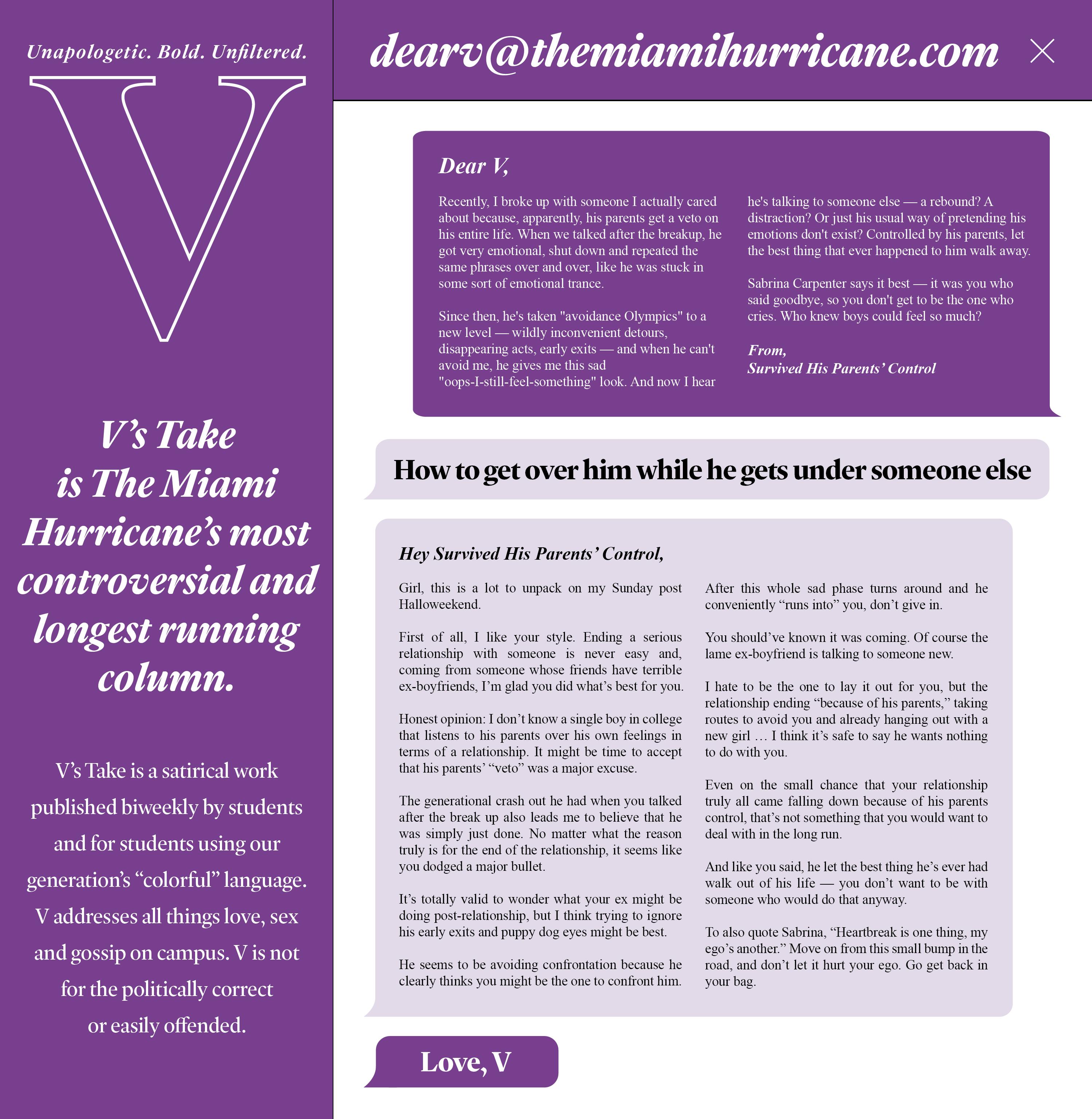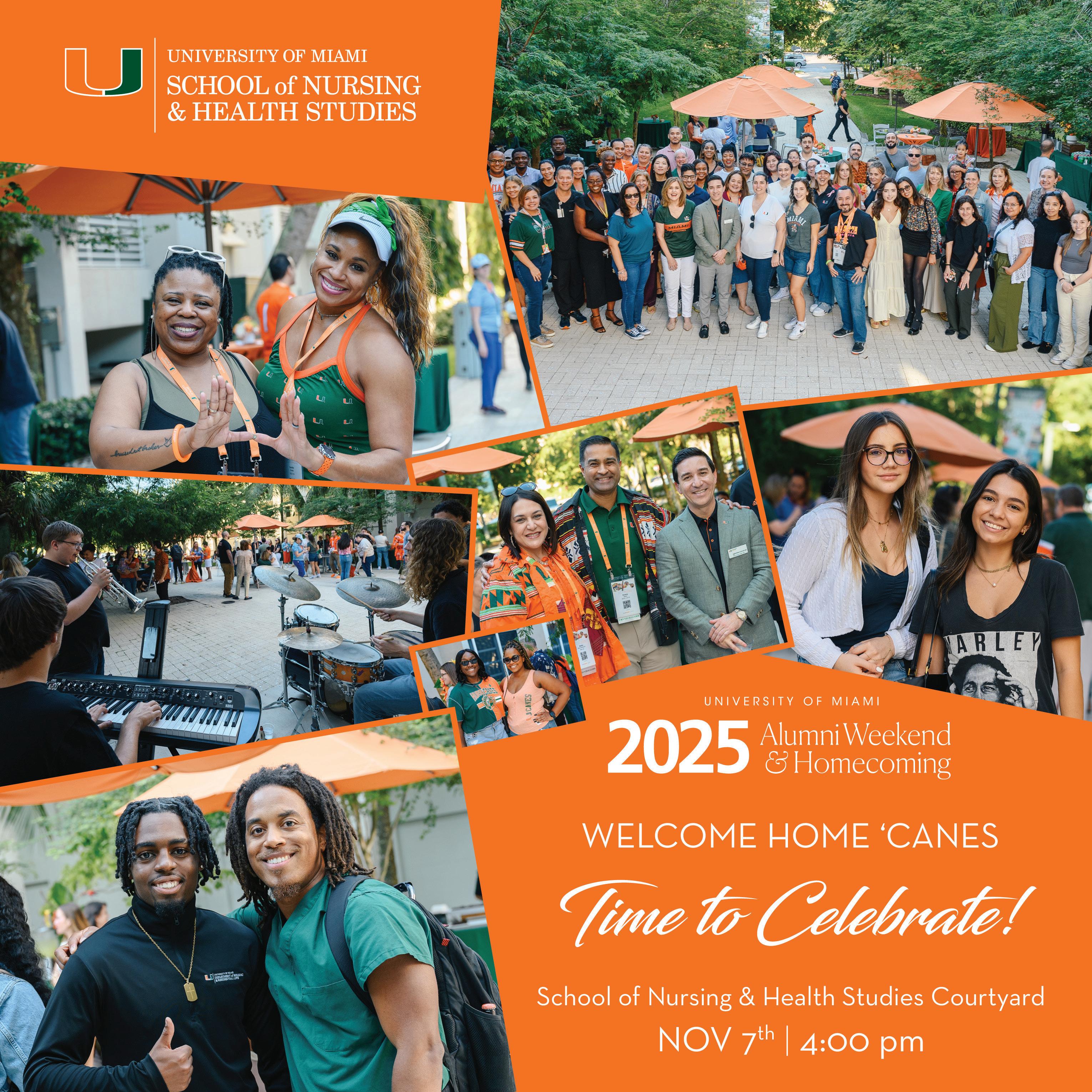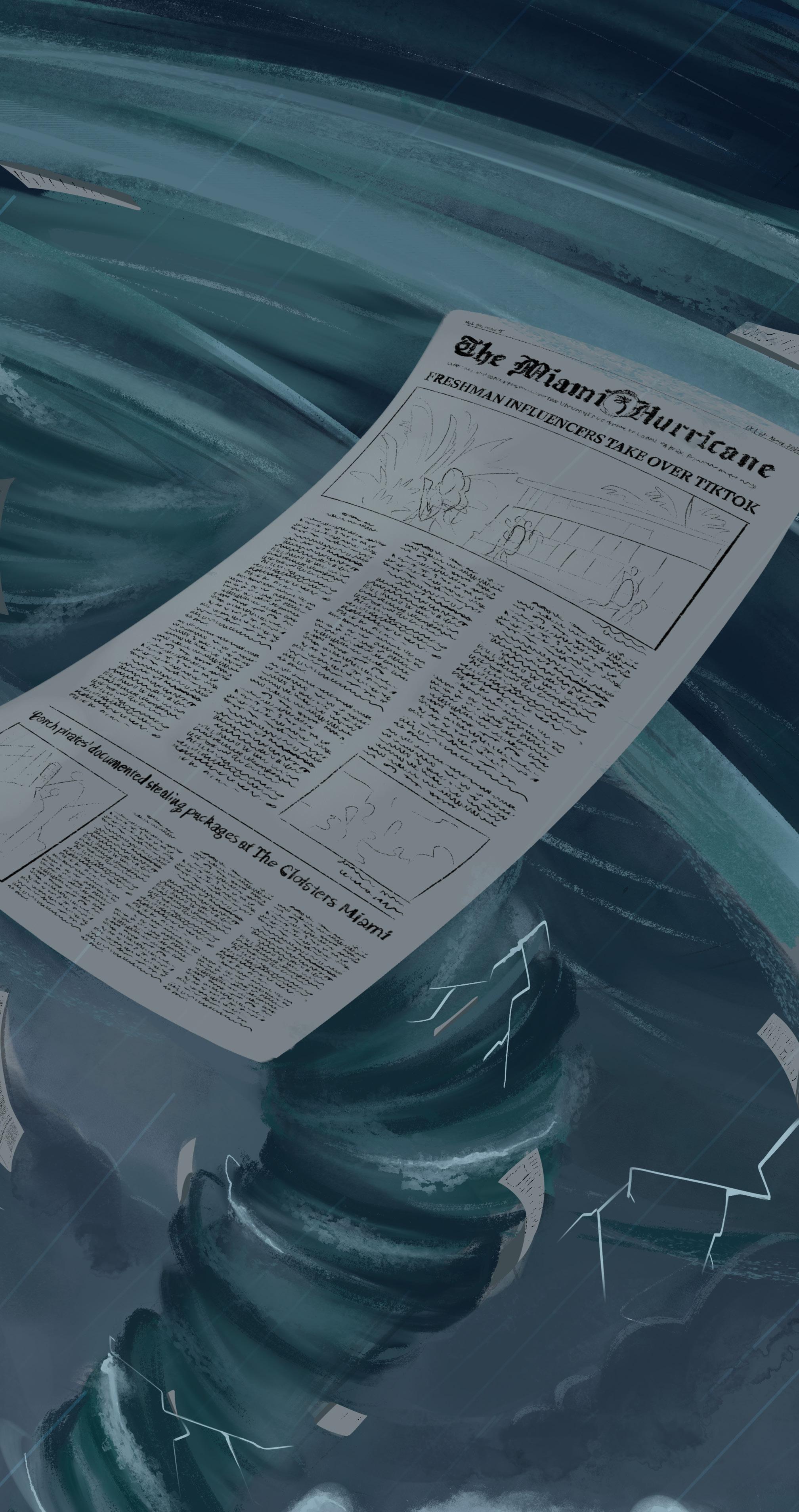




By Hannah Valdivia & Daniella Krasney Contributing Writer & Co-News Editor
The University of Miami was recently ranked No. 229 out of 257 colleges and universities in the FIRE 2026 College Free Speech rankings, dropping almost 40 spots since 2024. This is the lowest ranking of any Florida university on the ranked list.
The University received an overall score of 51.6 out of 100 points for overall free speech, a grade of “F.” Political tolerance, self-censorship and administrative support all received scores of “F.” Comfort expressing ideas scored a “D-”, and openness received a “D+.” Disruptive content was the only passing grade at a “B-”.
Although zero controversies at UM have been reported to FIRE between Jan. 3 and June 5 of 2025, two incidents made national news shortly before and after the FIRE data was compiled.
Dr. Michelle Bravo, a former neurologist at UM’s Miller School of Medicine, left her job at the University after a post she shared on X after the assassination of Charlie Kirk caused widespread controversy.
In 2024, Professor Rachida Primov wore a sash embroidered with the word “Palestine” on it, and made a public apology after violating the University’s political advocacy policy.
In another incident that did not make national news, UM’s Black in Business was instructed by the university to rename to “Belonging in Business.” The University followed guidance from a Department of Justice policy limiting “discriminatory language” and DEI programs, which was implemented by the Trump Administration.
One anonymous student who was quoted in the Free Speech Rankings said that UM’s campus climate limits students’ ability to express themselves.
“The University of Miami is extremely hesitant to allow speech that jeopardizes its financial interests,” the student said. “Protest rules have been altered to be extremely repressive, not allowing protests without permission from the University and requiring police officers (and a payment to support them). I have faced backlash for wanting to protest climate change, Christian right ideology and Zionism.”
Despite the low free speech ranking and faculty expression controversies, the University of Miami prides itself on its commitment to the First Amendment.
“At the University of Miami, we have and will continue to embrace the values of freedom of expression and the freedom of speech,” states UM’s Free Expression website. “With that comes the responsibility for each member of our community to treat each other with dignity and respect, and to be respectful of differing and diverse points of view and ideas.”
The University’s political demonstrations policy requires that all political demonstrations must be pre-approved by administration. The Dean of Student’s Office reserves the right to shut down, restrict or deny any demonstration “deemed inconsistent with the values and mission of the University.”
Associate Vice President of Student Affairs and Dean of Students Ryan
Holmes clarified in 2023 that there are no free speech zones on campus that allow for spontaneous demonstrations, emphasizing the need for prior University approval. This policy was clarified when a transgender rights walkout was cancelled after pushback by administration.
The policy furthers that demonstrations may not last longer than two hours.
Encampments, a method of protest used by students across the country to protest the Israel-Hamas war, are entirely banned. Israeli and Palestinian demonstrations have been limited to vigils and community gatherings at UM.
In the spring of 2024, Columbia University students engaged in several encampment protests in response to the Israel-Hamas war. The University then authorized police to arrest any students participating in the encampment before completely shutting down the protest effort. This sparked controversy across other campuses, as more than 100 universities set up their own demonstrations in solidarity on the following day.
University responses to these pro-
“If we cannot discuss important, sensitive and controversial topics in a worldclass university classroom, where can we discuss these things?”
Dr. David Weinert UM Professor
tests differed based on the schools’ individual policies, some allowing encampments and others prohibiting them altogether. Columbia University suspended and expelled nearly 80 students participating in a pro-Palestine demonstration, according to the Associated Press.
The University of Miami is not one of 148 known institutionally neutral colleges and universities, according to a report by Heterodox Academy, a nonpartisan organization promoting the First Amendment. According to the report, the number of institutions adopting neutral policies has skyrocketed after the Hamas terrorist attack in Israel on October 7.
The report says that 97% of universities that implemented neutrality policies sought to “create more inclusive campus environments where diverse viewpoints can coexist.”
Of the 148 neutral colleges and universities, only 33 were private, “sug-
gest[ing] that [private institutions] may feel less pressure to refrain from taking public stances on controversial issues.”
UM has made public statements commenting on political and social issues, including standing in solidarity with Israel after October 7.
Universities that take political stances could have a chilling effect on student expression. Students not aligning with their universities may feel afraid to exercise their First Amendment rights out of fear of being punished. In the FIRE survey, 30% of UM student respondents say they have self-censored on campus at least once or twice a month.
Administrations at other schools have faced criticism for actions perceived as limiting students’ First Amendment rights. Indiana University recently cut the production of all printed products of the student newspaper and terminated its student media advisor.
According to The Nation, IU’s chancellor stated that the shutdown was “strictly business,” claiming there are insufficient funds for the paper. But both staff and student editors at IU argued that it was a blatant violation of their First Amendment rights and suggested that the University’s actions constituted censorship.
In FIRE’s ranking, UM is placed just 33 spots higher than Indiana University.
A 2024 Knight Foundation study found that students believe their ability to express contrasting ideas and use their freedom of speech has declined drastically in the last eight years. An increasing number of students also reported that “the climate at my school or my campus prevents some people from saying things they believe, because others might find it offensive.”
First Amendment scholar and UM professor Dr. David Weinert feels strongly that students should be able to discuss polarizing topics on-campus.
“As educators, we are tasked with presenting pertinent sides to important freedom of speech issues, then letting the students evaluate the same information,” said Weinert. “If we cannot discuss important, sensitive and controversial topics in a world-class university classroom, where can we dis
cuss these things?”
Weinert emphasized that private in
stitutions like UM are free to set their own speech and expression policies, as they are not government entities. However, he emphasized that restrictions should only be used when free speech is “materially and substantially disruptive to the educational process.”
He said that “Unwarranted censorship by university administrations rais
es free expression red flags.”
When asked if he believes students’ rights to free speech have eroded over time, he agreed.
The University of Miami Republican and Democratic clubs have each supported ideas of open expression and debate, believing that students must be aware of their rights and exercise them effectively.
“The right to speak freely, granted to us by our Constitution, must be preserved and protected in the classroom and throughout campus,” said the UM College Republicans in a statement to The Hurricane.
“We deserve to learn what free speech means in a real society,” said ju-
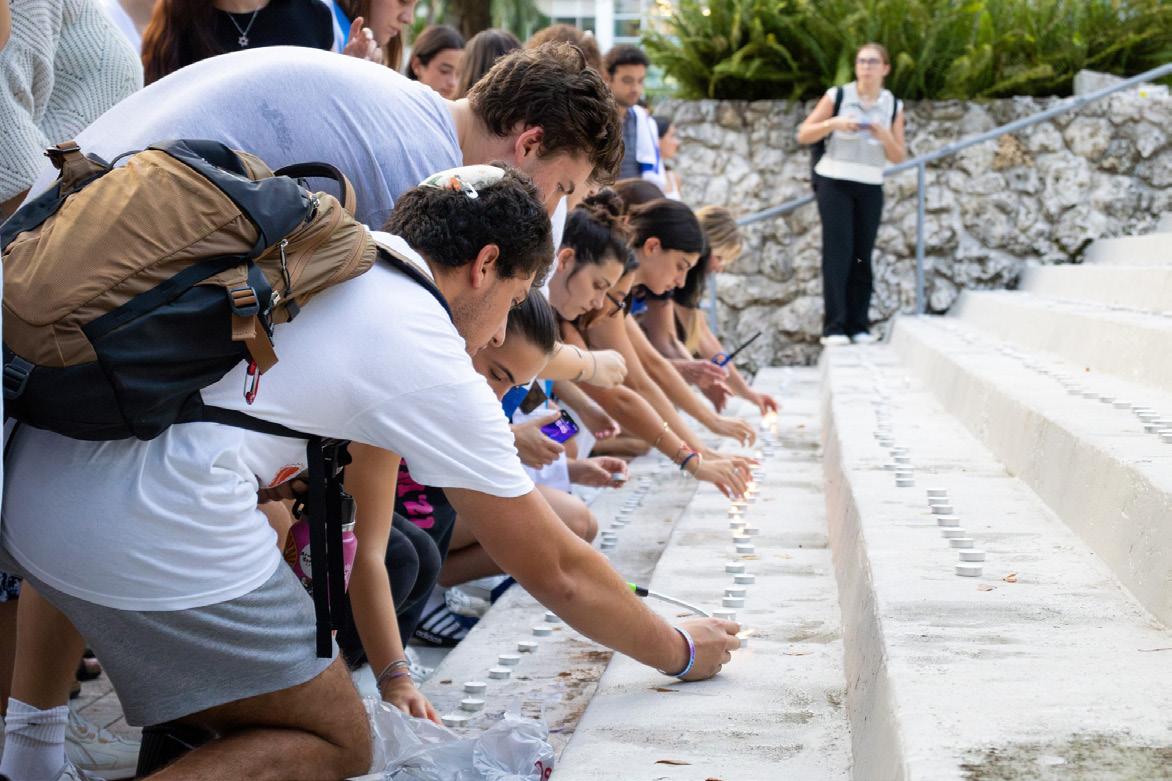
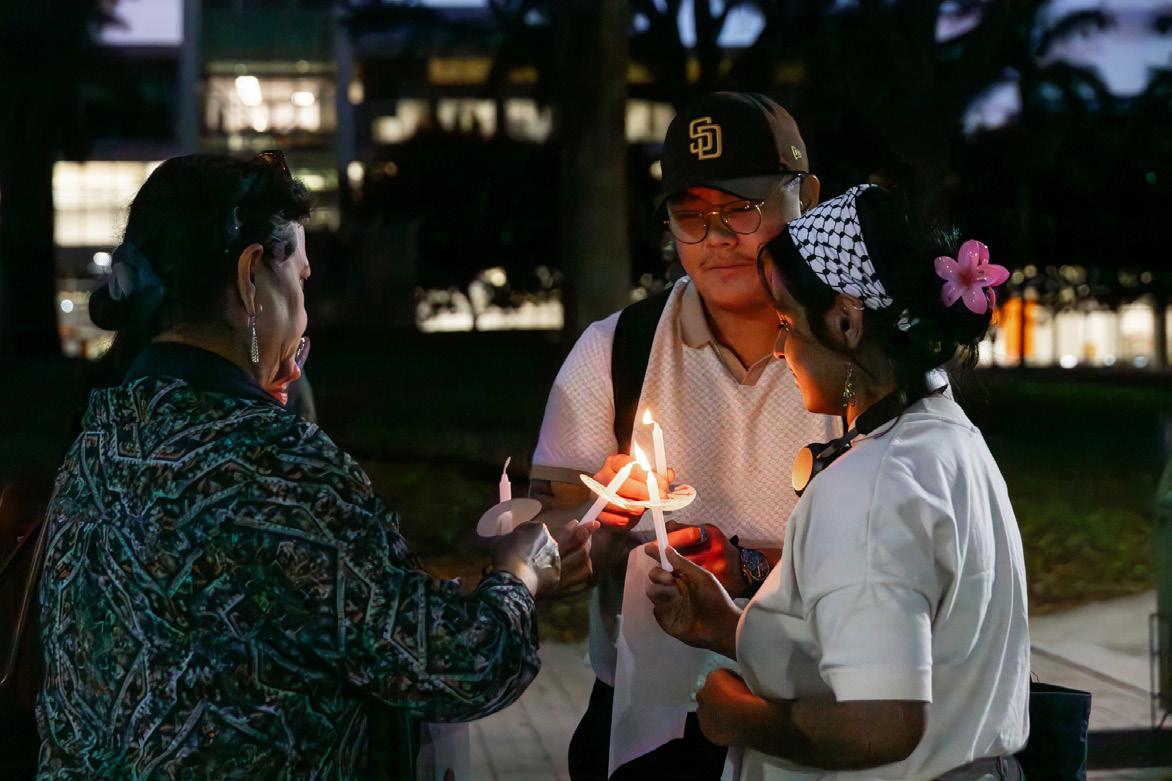
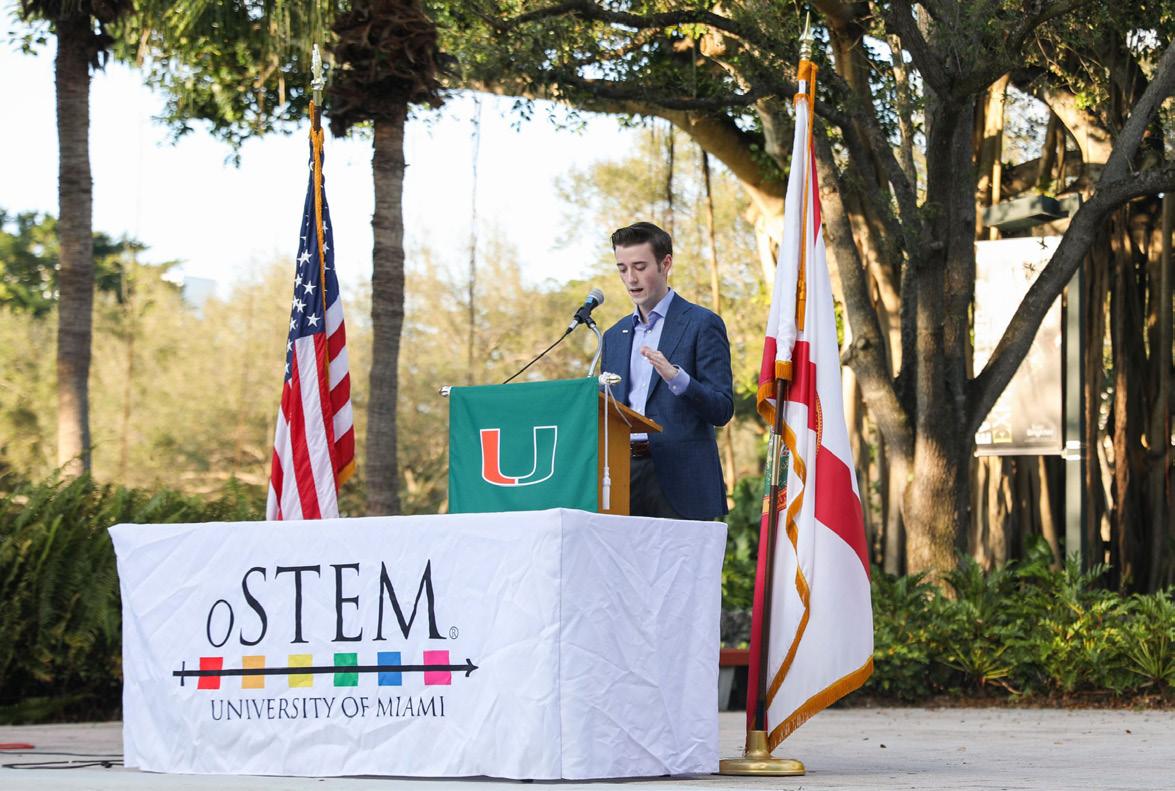
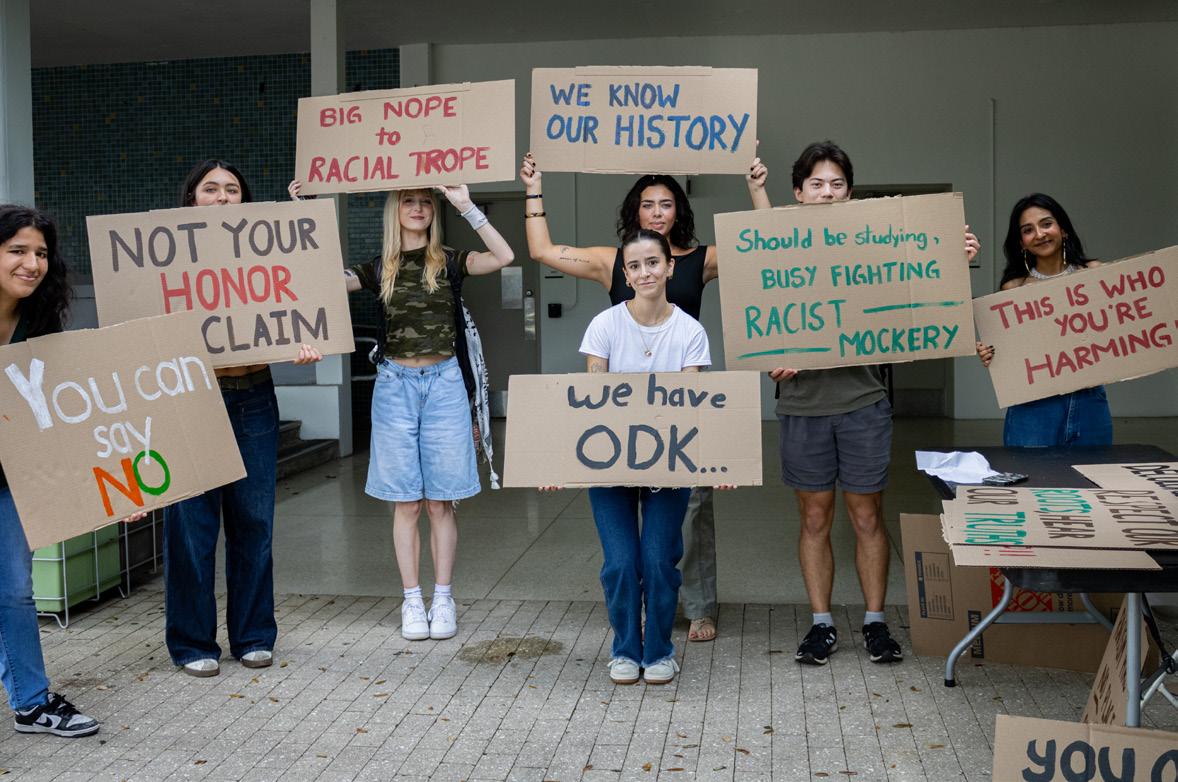
nior Bella Whitlock, treasurer of UM’s Young and College Democrats. “The mission of a university should be consistent: teaching, research and fostering critical thinking.” Weinert emphasized that the First Amendment is crucial to establishing a marketplace of ideas in higher edu-
By Elena Fallow Co-News Editor
The University of Miami has gone viral for the number of influencers attending the institution. More recently, attention has been focused on how these influencers responded to the controversy.
Two weeks ago, The Miami Hurricane published its latest print edition, featuring three freshmen influencers, Colette Coulliard, Nikki Pindor and Julia Thomas, on the cover. On the same day, freshman influencer Sienna Long, who was also interviewed for a feature, posted a vulnerable TikTok video reacting to not being included in the print edition, particularly on the front cover.
In the post, she shared the realities and struggles of trying to grow her online following in the competitive environment of social media.
Long’s video has received 1.3 million views, has been shared 11.4 thousand times and has gained the attention of other well-known creators including @SohoBrody and @skysolomon_, another UM influencer, on TikTok.
Because of the post’s virality, Long received negative feedback, body shaming comments and death threats.
“It was never supposed to be that
deep,” Long said in an interview with The Hurricane. “The point of the video was that it was a wake up call for me to focus or not focus on it, to care or not care about my TikTok.”
Nikki Pindor, one of the creators featured on the cover of The Hurricane’s latest print edition, is one of the many creators who made a video reacting to Long’s.
Pindor’s video gained 859.4 thousand views. It was followed by a post alleging that Pindor received a message from Long about Pindor’s reaction.
Pindor then posted another video claiming she was issued a no contact order by the school and was asked to meet with Deputy Dean of Students Steven Priepke.
Mutual no contact orders are one of the resources used by the school to support students.
According to the University’s Student Rights and Responsibilities Handbook, “No Contact Orders are not considered disciplinary related measures but they can result in student conduct charges if they are not adhered to.”
As influencer drama intensifies, it leads to tangible consequences for those involved.
According to the National Library of Medicine, 58.7% of the global population uses social media. Additionally,
68% of college students report using social media for six or more hours a day. This large amount of consumption can distort people’s perception of what is real and not real on social media.
A survey conducted by BBB National Programs concluded that 74% of surveyed U.S. consumers trust or somewhat trust influencer content.
According to the National Library of Medicine,
68% of college students report using social media for 6+ hours a day.
“Social media is not reality. That should be focused on a lot,” said Long. “I can say one thing and it will get blown out of proportion, but it doesn’t make it true.”
Long is seeing the effects of what is being said on social media in her dayto-day life.
“There’s whispers and there’s photos,” she said. “And so I kind of just put my headphones on, I block it out, and
I just walk to class, and I get back, and just live my normal life, ‘cause what else are you gonna do?”
Long is not the only influencer that has experienced real life consequences due to posts on social media.
In an interview with The Miami Hurricane’s podcast, Eye of the Hurricane, Pindor shared that she received backlash after making the cover of the latest print edition.
“I saw a lot of people doing a lot of things with my face,” Pindor said. “I saw someone kill a spider with it, I saw someone just rip it up.” Pindor has adopted sobriety out of fear of being recorded and reported to the dean.
“A lot of people at the school would record me if I was drinking. If they are sending my TikToks to the dean they are going to send videos of me drinking obviously,” Pindor said. “If I get caught consuming alcohol or any illegal substance I can get expelled.”
Pindor noted that the concern of being recorded or photographed in public has affected her day to day life. She has not been to the dining hall in four weeks.
“Everytime I go [to the dining hall], I go on YikYak and see either a photo of me or a couple posts saying ‘I just saw Nikki Pindor eating ice cream and brownies and cake.’”
cation and the United States at
where controversial speech
and should be protected.
“I remind my students that the purpose of the First Amendment is to protect unpopular speech. If all speech was popular and pleasant, there would be no need for the First Amendment.”
Pindor is not the only influencer on campus to be criticized by posters on YikYak. Senior Sienna Sacco shared her experience with YikYak and being an influencer in her episode of Eye of the Hurricane.
“I feel like I have always been posted on Yik Yak for so much, and I deleted Yik Yak for like a while,” Sacco said. Her advice to get over the hate, “You just genuinely cannot let it bother you at all.”
Sacco expressed that the pros that have come from her social media presence outweigh the cons. She shared that her social media presence helped to propel her modeling career.
“Social media definitely helped with modeling. It boosted me up,” Sacco said. While the realities of social media may seem daunting, it is the people that surround these influencers that help them to keep going.
Long said that her family and friends have been amazing in supporting her through this difficult experience of public backlash. When asked about particular advice she has received, she read a text message from her mom’s boyfriend, who Long said has been incredibly helpful while she navigated the past weeks.
“Sometimes you have to stand alone just to prove you can still stand, promise it’s going to make you stronger,” Long said.
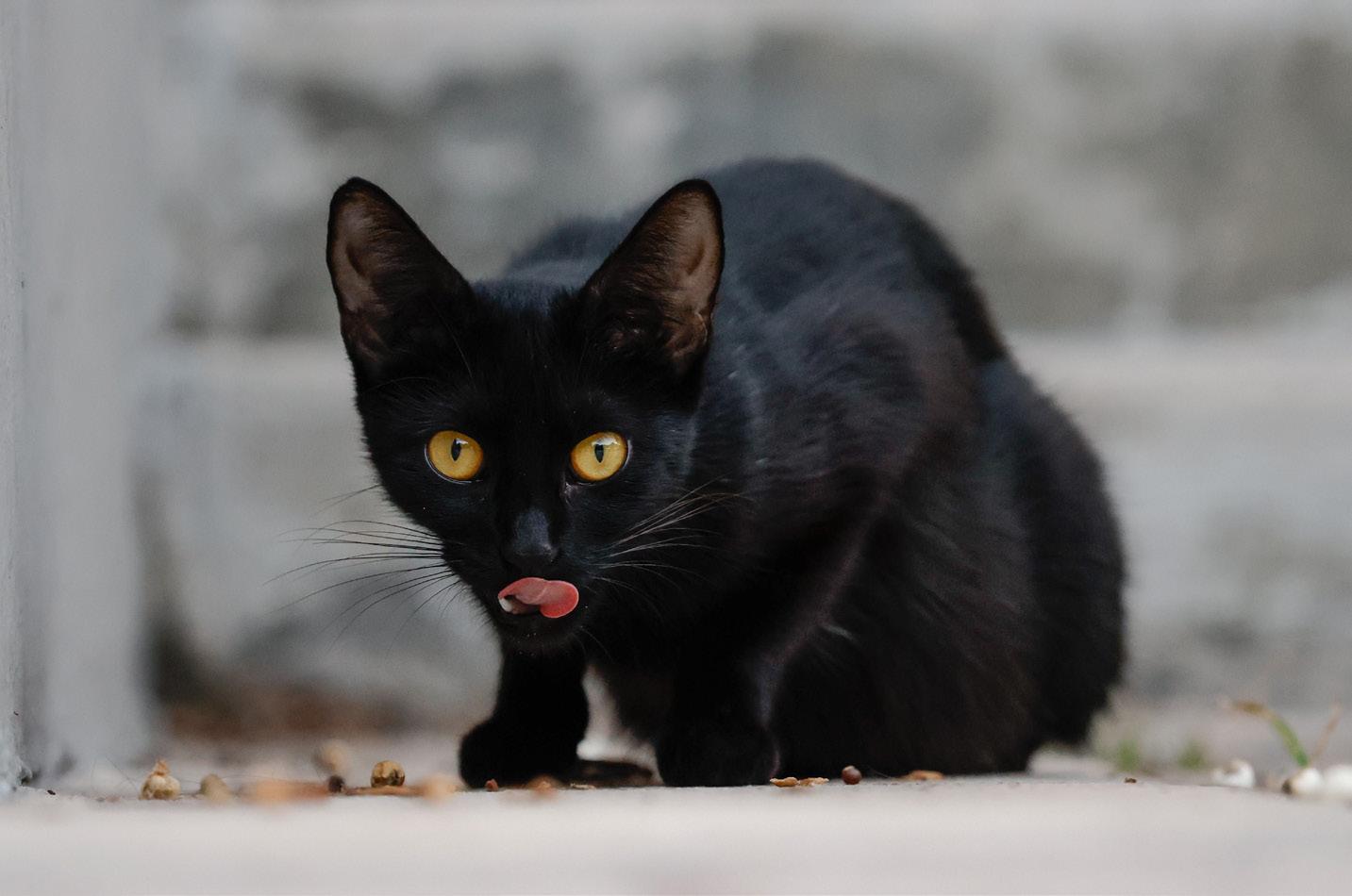
mane way to stabilize the population of the cat communities, as well as lower the number of cats euthanized in shelters.
A number of stray cats live around The University of Miami campus, and people from the community are wondering where they came from and how they are surviving in the chaos and construction surrounding the university.
Due to the demolition of Hecht Residential College in 2022 and the Stanford Residential College in 2024, many students expressed concern for these campus cats that were seemingly displaced.
However, a community member and UM alum who wishes to remain unnamed claims that these cats have been on campus for much longer than the past few years.
“When unique or protected wildlife or vegetation is found within a construction zone, the University follows best practices to safely relocate or rehouse it,” said the University of Miami in a statement to The Hurricane. “No animals — native or non-native — have required relocation for this project.”
The initial interest of the furry friends on campus was where they came from and how they are handling the construction, but the more interesting part is actually the state that they are in.
Most of the campus cats are spayed and neutered, and well fed, thanks to UPurr.
UPurr is a student-run organization here at UM that focuses on helping the cats on campus by hosting rescues and social events, all while creating a community of cat-lovers.
According to their TNR Coordinator, Isabella Gudin, the group hosts TNR events where they trap unsterilized cats on campus in groups called “cat colonies,” and take them to an on-site location through The Cat Network to get spayed or neutered and vaccinated.
The TNR Program is an effective and hu-
TNR also helps the stray cats better coexist in the community because they are no longer looking for mates or marking their territory.
The UPurr Instagram posted photo slides of their latest TNR event on Oct. 4 with the caption, “Thank you to volunteers who came out to help during the September and October TNR events. We trapped and had seven cats spayed/ neutered and vaccinated.”
The University of Miami states, “Their commitment to responsible care makes UPurr an essential contributor to the health and balance of the wildlife at the U.”
While TNR is an important part of taking care of the campus cats, it costs roughly $100 per cat, which can add up. However, this price is significantly less expensive than taking the cats to a traditional veterinarian.
UPurr’s website states, “Cats must be returned to their environment according to Florida State Statutes 828.12 and 828.13, in which relocation of a homeless cat or any animal in a public place or abandoning an animal that has been trapped is illegal.”
This means all cats trapped on campus must legally be returned unless they are friendly enough to be adopted or fostered. In order to ensure this, members carefully label the carriers of the cats sent to The Cat Network for TNR.
The cats are often seen eating from dishes filled with cat food around campus. Some of the cat food is provided by UPurr via donation money and given to “colony caretakers” to feed the cats, and some is bought and supplied by members of the community.
While the cats are an invasive species, most people find them to be a great addition to the wide variety of wildlife on campus.
“Going into Miami I always hated cats, but being here where there’s so many made me re-
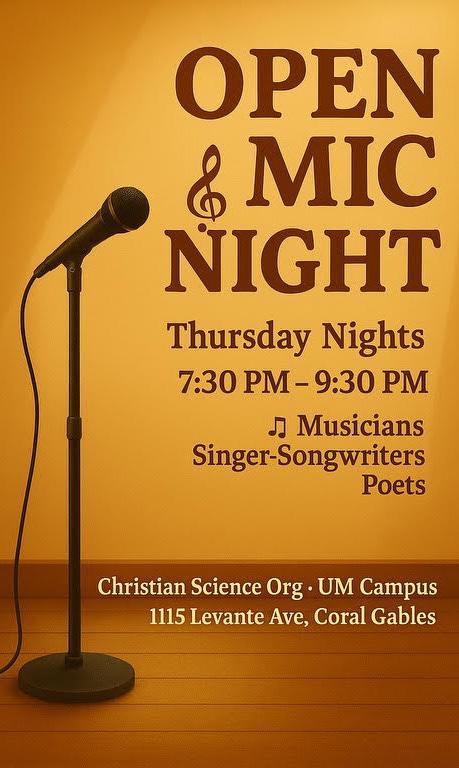
alise I want a furry companion for when I have an apartment next year, and I would love to have a cat,” says Amanda Donnelly, UM student.
UPurr President Kendall Arnold says, “I think a lot of people have this idea or stereotype that cats are mean or they just like to be alone and they don’t like you, but that couldn’t be farther from the truth.
The cats can also be recognized by names that students and community members have given them
More than 100 janitors and allies marched through downtown Coral Gables on Wednesday, Oct. 29, calling for the right to organize and an end to what they see as unfair wages. The march featured an 80-person marching band dressed in purple, complete with drumming, chanting and calling for justice for janitors.
“Justice for Janitors! Yes it can be done,” protesters chanted in Spanish at the rally. “When we fight, we win!”
32BJ SEIU, a union representing property service workers across the U.S., including University of Miami janitors, had success earlier this year when it reached a tentative contract agreement with ABM, the University of Miami’s cleaning contract, after protesting at the University of Miami.
Now, the union is organizing against another major cleaning contractor in South Florida: AK Building Services. Janitors from the University of Miami were seen wearing purple shirts and leaving campus on Wednesday around 4:10 p.m., presumably to attend the march.
The demonstration is part of the nationwide Justice for Janitors movement, led by SEIU, which represents tens of thousands of mostly immigrant office and university cleaners across Florida and the country.
“While union janitors represented by 32BJ SEIU earn higher wages, benefits, and job protections, janitors employed by AK Building Services lack those same contractual guarantees,” 32BJ said in a statement to The Hurricane. “Some AK janitors have reported having to clean without gloves or cleaning products, sometimes using only water. One worker said she had to clean a toilet with blood without gloves.”
In addition to those contract guarantees, the union is looking to guarantee AK employees’ right to organize.
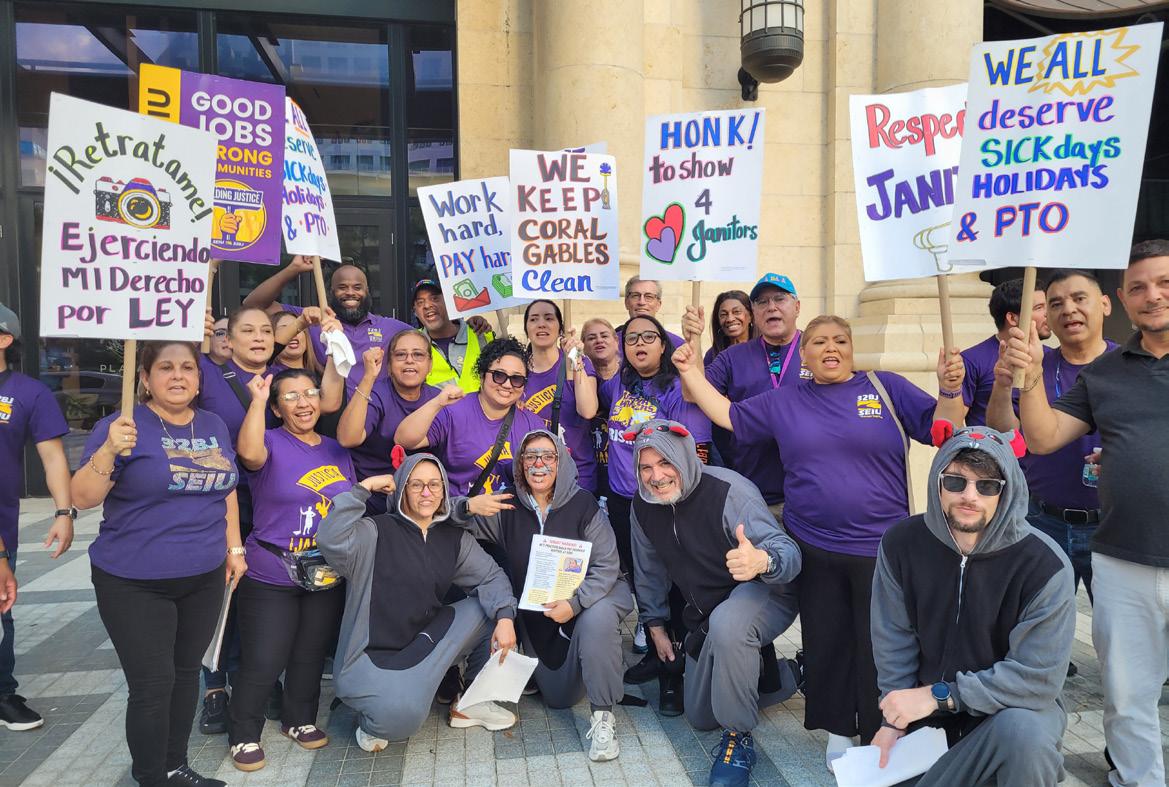
Workers have also reported surveillance and intimidation tactics.
According to a statement from 32BJ, police were called on 32BJ janitors at a Coral Gables building for speaking with AK workers about joining a union.
“The vacuum cleaner they gave me had a frayed electrical cord, and when I used it, I got an electric shock,” Yenni Martinez, an AK Building Services janitor, said in a statement to The Hurricane. “Sometimes we didn’t have enough gloves or cleaning supplies and had to clean using only water. I take pride in keeping my area clean, but it’s hard to do a good job when you don’t have the materials. You can’t take out grease with just water.”
In a statement to The Hurricane, AK denied 32BJ’s accusations, stating that their employees have not expressed an interest in unionizing and have received “competitive wages, along with open, direct communication with both management and ownership.”
“Over the past three years, …SEIU Local 32BJ has engaged in false, disparaging, and disruptive actions in an effort to pressure AK Building Services into unionizing, despite a clear and consistent lack of employee support for such efforts,” Shari Cedar, the CEO
and owner of AK, said in AK’s official statement to The Hurricane. “...TIf the union truly believed otherwise, they have every right to file for a secret-ballot election with the National Labor Relations Board. Instead, they have chosen to relentlessly harass our employees and customers without cause.”
The statement continued to emphasize that AK Building Services values its employees and prides itself on a culture of respect, and that it will not be “intimidated or distracted” by the continued marches.
The march concluded at The Plaza, a $700 million retail and residential complex owned by Agave Holdings. There, janitors employed by Allan Industries, a company whose workers remain non-union in Coral Gables, lack the wages, benefits, and job protections their coworkers have won elsewhere.
“Downtown Coral Gables is booming, with high-end shops, restaurants, and office buildings,” Andy Cabrera, District Leader for 32BJ SEIU, said. “Yet the workers who keep these spaces sparkling clean and ensure profits for real estate investors are treated as disposable. All janitors deserve fair wages, good benefits, and the right to organize without fear.”
like “Jellybean” and “Tiger,” or the UPurr E-Board like “Susie,” “Simon” and “Shadow.”
“Seeing them on campus just makes me so happy. I think it’s nice to see little creatures on campus, especially little furry ones,” says Camila Goveo, UM student and cat lover.
Information about the cats on campus, cat adoption, TNR and upcoming UPurr events can be found on UPurr’s Engage page.
PhiDE Raises $2,500 for Nicklaus Children’s at philanthropy carnival
By Ariana Glaser Contributing Writer
The University of Miami’s chapter of the Phi Delta Epsilon Medical Fraternity celebrated its biggest event of the year, “Stand for the Kids,” on Oct. 22, 2025.
The annual tabling event serves as a fundraiser for Nicklaus Children’s Hospital, Miami’s only exclusively pediatric healthcare system. The Foote Green turned into a carnival, completely decked out with a dunk tank, bounce house, inflatable bull ride and many other activities.
“It’s just so wonderful seeing everyone come together for a certain cause, like to support the children,” said Sydney Litten, one of PhiDE’s event planning chairs who helped to organize the event. “You really see the community that we have built when we all come together.”
“Stand for the Kids” is one of the fraternity’s internationally trademarked events, meaning that each chapter worldwide has their own annual version of the fundraiser on the same date. Last semester, PhiDE’s Anatomy Fashion Show raised more than $10,000.
PhiDE CEO Karen Katz notably made an appearance. Though she “can’t have favorites,” she shared that the University of Miami’s chapter is definitely near the top of the list.
“When our headquarters was in Miami, we chose five chapters to beta test ‘Stand for the Kids’ in 2012 before it became the international philanthropy day,” said Katz. “The University of Miami was one of those.”
The fundraiser was fostered in part by the Children’s Miracle
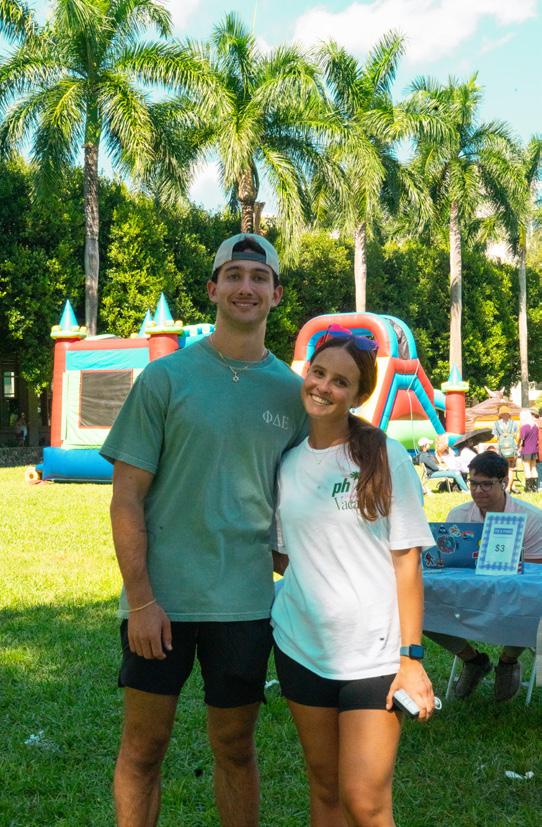
Network, which serves as a liaison between PhiDE and children’s hospitals across the United States.
“We chose Children’s Miracle Network because we were and are their current physicians,” said Katz. “We wanted a charity or philanthropy where we could not only raise money, but also take part in making a difference daily.”
Through this event and others, Phi Delta Epsilon has raised more than $2 million for children’s hospitals worldwide.
“I believe this philanthropy does a lot for our hearts because when you become a physician, you are always in the hospital but you can leave at the end of the day,” said Katz. “When you’re a patient, you [can’t] necessarily do that. So this is a reminder of how important it is to remember that these children are not just patients. They are someone’s child. They are the future of the world.”
to The Miami Hurricane Anonymous I’m not sure who’s in much of the graphics but I wish they had come to me first about it, especially given that this was already extremely hard for me to talk about.
...however I do ask that I remain anonymous and am not directly quoted.
to The Miami Hurricane Anonymous I mentioned in a previous email that I would look into these questions for you, as I know you sent them both the U.M. media inbox and me. Could you please work through me as your PR contact? Mass outreach creates confusion and redundancy when we are all seeking answers to the same questions.
We were wondering how you obtained the quotes from xxx, xxx, and xxx. - Anonymous - Anonymous - Anonymous
to The Miami Hurricane Anonymous Please don't put that in yet. I'll have something for you shortly.
I’m extremely unhappy with the cover of the magazine. It’s incredibly inappropriate and doesn’t represent what we talked about on the phone at all.
By The Editorial Board
College newspapers across the U.S. have faced retaliation from all angles — from administrators, students and even the very schools that should be their biggest defenders.
The message to student journalists over the past few years has been loud and clear: stay quiet, or face the consequences. But journalism was never meant to whisper in the face of power.
The Miami Hurricane’s 20252026 editorial board has poured immense amounts of effort and time into our coverage. We’ve worked tirelessly to dig deeper, ask harder questions and report stories that truly matter to our campus community.
That work has not gone unnoticed. Students, professors and alumni regularly stop us around campus to share how much they appreciate our reporting. We have even heard from people in other states and countries who are following UM’s news because of The Hurricane’s coverage.
The numbers speak for themselves — our social media following has nearly doubled since April, and our print editions have been flying off the stands within days of distribution. In October, our Instagram reached an all-time record of 1.73 million views over a 30-day period.
This increased level of relevance and visibility reinforced our responsibility to remain fair, accurate and unbiased in our reporting. Our goal has never been to please everyone. Even with the overwhelming positive feedback, not everyone will agree with, or like, everything we publish. But our mission has always been the same: to inform, to hold those in power accountable and to make sure our community has access to the truth.
The more relevant and visible we become, the less the university seems willing to engage with us.
Despite multiple meetings and calls with University Communications since the beginning of the school year, our repeated requests for comment are often met with silence or responses delayed well past our deadlines.
Under standard procedure, The Hurricane works through University Communications to get quotes from our sources, which range from departments and administrators to faculty and doctors.
However, our reporters frequently have to submit multiple media requests and follow up repeatedly — often without acknowledgment. In several cases, this lack of response has forced us to bypass our standard procedure involving the University and contact our sources directly to complete our reporting.
Administration’s reaction
Just a few weeks ago, The Hurricane published an article about the opening of SoLé Mia, UHealth’s new ambulatory center. This article was a simple, non-controversial news story about the opening and details of the center, but the University barely helped us.
The Hurricane attempted to have UM facilitate interviews with leadership and doctors, but aside from a phone call that The Hurricane was asked not to quote, the only material the University provided was a press release that was eventually distributed after our print deadline.
After days of reaching out to UM,
The Hurricane made the decision to go around the standard procedures and contacted doctors on our own for the article.
After this, members from the University emailed the editor-in-chief asking how we got quotes from these doctors.
Part of the email read, “we are particularly interested in why Dr. Lopes, an oncologist, is quoted giving revenue information on behalf of the health system which may or may not be accurate as that information was not provided by our chief financial officer.”
As previously stated, the University offered no help in connecting us with anyone, let alone a CFO.
How are we expected to report on news affecting our campus if the institution we cover often refuses to engage with us and then criticizes us for finding information elsewhere?
If student journalists only repeated the information contained in press releases, which are obviously curated to cast the university in a positive light, we
would be failing our community. Our role is not to echo, but to investigate.
When the university we cover refuses to engage, it limits our ability to serve our readers — but it will not stop us.
Student backlash
Students who write critical stories have faced backlash from their own peers in the past. The Hurricane has covered multiple incidents of fraternity misconduct in recent years. Frequently, these articles that report the facts about sensitive topics are the ones that cause the most backlash from students, especially from fraternity members.
“[Greek life], I think, [is] a very close-knit community and people are very protective of their fraternity for understandable reasons,” said Jenny Jacoby, former editor-in-chief of The Hurricane.
Most of the time, articles about fraternity misconduct report on issues that are already public. This includes Jacoby’s article that received a lot of backlash, particularly on social media, in 2024.
“I just think that they didn’t like that I was the one to push it to that legitimate level as opposed to just hearsay,” Jacoby said.
Fraternity brother backlash was not the only negative thing Jacoby experienced in her two-year tenure, but she said it was very eye opening and, at times, made her reconsider her career choice.
“[My experiences] made me really, really scared of what a career in journalism would look like and made me question whether or not I could actually handle that for a career,” said Jacoby.
The message the backlash sends is scary: Silence is safer than honesty.
When reporting on student news like possible hazing allegations, we are not whistleblowers or tattletales — we are journalists reporting the news to the student body. We are doing our job.
When we publish articles about student organizations, leaders of those groups frequently ask to pre-approve quotes, visuals or the entire article prior to publication.
UM’s Black in Business was instructed by the university to re -
By Tori Lopes Contributing Writer
It’s gameday. You have your outfit planned and scoped out the perfect seats ahead of time to cheer on UM’s football team. You leave your tailgate and walk through security. You’re all pumped up for the game and scan your student ticket.
But you can’t get in because the student who sold you their ticket scammed you.
That was the reality of Ashton Weissman, a current junior at UM, who spent the entire first half of the UF vs. UM game standing outside Hard Rock stadium waiting with his friend. The ticket that was transferred to his friend had already been scanned for entry on another device.
“We had to wait until half, and we woke up super early for GameDay that morning. We were super amped for the game, and it just really blew it for us,” Weissman said.
Weissman’s experience is one that was shared by many students that day and serves as a testament to the ridiculous ticketing policy. Students should be allowed to seamlessly transfer their “free” tickets to friends given how much students spend on their athletic fee.
Student ticket scams have been on the rise and they are not just limited to our football games. These scams are only made worse by the policy that does not allow students to transfer their student tickets.
Of course, buying a ticket off of
someone is always a risk because of this non-transferable ticket policy, but things would be made so much easier if students were just allowed to sell and transfer their tickets.
Scams have happened at other UM events as well, notably at the fall and spring commencement ceremonies, which also have limited tickets.
Though I am currently working towards my masters, I graduated from UM with my public health degree this past May. I was so proud and couldn’t wait to see the excitement on my family’s face, until I found out five weeks before graduation that I was at risk of not having my whole family attend the ceremony. I consistently called the ticket office for advice on how to get more tickets, and they advised me to reach out to students that are not using all of their tickets. Boy, what a frenzy that caused.
My mother and I found ourselvesbegging for tickets in Facebookgroups of parents and other UM students selling their unused graduation tickets. We saw prices as high as $150 per ticket, people auctioning off their tickets on other platforms like Snapchat, all of which were unregulated and, frankly, unfair.
My mother reached back out to the ticket office outraged, asking how they were unable to give us more tickets for family members when students and their parents were blatantly profiting off of this desperate situation. Their response? You guessed it, crickets.Thankfully, I was able
to get a couple of tickets from a friend of mine in the correct manner, but this is not the case for many students who are forced to seek out tickets in other ways.
There need to be better practices in place. A change in how student tickets can be returned or exchanged is necessary.
Students should have the option to transfer tickets securely through an official UM platform to other students, ensuring that both parties are protected and the tickets remain valid. Establishing a regulated system would discourage scams and hold individuals accountable for dishonest reselling.
Most importantly, it would restore fairness and trust in a process that’s meant to bring the UM community together, not divide it.
Attending a UM game or celebrating commencement should be moments of pride and unity, not frustration and distrust.
Currently, the Student Tickets section of the Miami Hurricanes athletics website states, “For all full-time undergraduate students, the athletic fee is mandatory and was automatically paid during the enrollment process.”
The website continued to state that “Graduate students and part-time undergraduate students have the opportunity to opt in and pay the athletic fee in order to claim complimentary tickets to Hurricanes athletic events.”
The irony lies in the word “complimentary.” While the university labels student tickets as free, paying the man-
name itself “Belonging in Business” in compliance with Department of Justice guidance issued under the Trump administration, which restricted “discriminatory language” and DEI programs.
Students involved in the article later told editors they were unhappy with the illustration and how their quotes were represented — even though the interview was recorded and they had full control over what they chose to say.
As journalists, we can’t play this back-and-forth game of approvals and letting sources review quotes or drafts only for them to object after publication. We operate under two-party consent; we ask permission to record and our sources know they’re being recorded. They are responsible for their words at that moment. We can’t rewrite stories to ease regret after the fact.
At the end of the day, student journalism isn’t about making everyone comfortable, it’s about telling the truth, even when that truth challenges large groups or popular opinions. Backlash will come and go, but credibility lasts. Our job isn’t to protect feelings, it’s to report facts.
Financial pressures
The Hurricane has also been struggling with funding, as our budget has not been reevaluated in years, even as Florida’s minimum wage increased. But this issue isn’t just affecting us at The Hurricane.
At the annual MediaFest25 convention in Washington, D.C., our reporters spoke with Jim Rodenbush, the former Director of Student Media at Indiana University, who oversaw the Indiana Daily Student newspaper. IU’s paper is currently facing major funding challenges after Rodenbush’s termination, which led to its complete defunding after 158 years of being printed. Since then, Rodenbush has sued Indiana University over his termination.
The Indiana Daily Student is currently facing major issues with IU’s administration, especially after Rodenbush was fired. His termination came after Rodenbush resisted prior instruction from IU adminis-
tration officials to stop publishing any hard news coverage. This decision has since been overturned, and the IDS has been permitted to use its 2025-2026 budget “as the editors see fit,” according to the IDS.
“In September, we ran a story about the provost’s office and administrative bonuses that had not been made public,” Rodenbush said in a phone call with The Hurricane. “After that story ran, I was called into a meeting with university communications officials who expressed ‘concern’ about the paper’s tone.” IDS is just one of many papers facing these issues. Now more than ever, students need a platform that empowers them to speak up and be able to form opinions on what’s happening in the world.
There is no indication that the University of Miami would take similar action, but witnessing these cases across the country remains extremely troubling. We appreciate that UM has upheld its commitment to protecting the voice of its student media in this political climate.
Looking into the future
Despite these pressures, The Hurricane remains committed to serving the UM community with integrity, fairness and rigor.
Through every unanswered email, every piece of criticism and every challenge, we’ve learned that journalism’s value isn’t measured by how easy it is — but by how necessary it remains.
We will continue reporting the stories others avoid, asking the questions others won’t and holding our university to the same standard of transparency it expects from us. When students hold power accountable, they strengthen not just their campus, but the principles of accountability and trust that sustain it.
The Hurricane will keep doing what it has done for nearly a century: reporting the truth, even when it’s inconvenient. We report for our readers, for our university and for the future of student journalism.

datory athletic fee grants you access to obtain them, so “complimentary” might be a bit of a stretch.
At the bottom of the website, UM prompts students to contact the ticket office or the Dean of Students if they suspect a scam. Students are also advised to only claim students if they plan on attending, and that there is no return option on tickets. As students, we pay a lot of money in tuition to attend this school, on top of another fee to attend athletic events. If we are going to spend even more money to get to see our team for “free,” then why are we dismissed when we point out these scams? If we are paying for no intervention and no ability to give back unused tickets for fair transfer, then we should be able to opt out of the athletic fee and sell
our student tickets as we please. Of course, selling your student ticket leads down a rabbit hole of issues. It is disadvantageous to students who face financial strain and undermines community spirit. The athletic fee ensures that students financially contribute to their access to tickets, confirming that these tickets are not truly free. However, not enforcing a system for ticket reselling undermines the fairness of the system and diminishes the value of paying the required fee. By implementing a secure and transparent ticket exchange system,
By Alex Airapetov Contributing Writer

The University of Miami is known for its palm trees, vibrant campus life and strong academic reputation. But it’s also known as one of the country’s most expensive colleges. For prospective students, the question isn’t about the quality of education, but about the price tag.
The cost for tuition and fees alone is around $65,000 per year. With oth er essentials like housing and trans portation, the total cost of attendance is almost up to $100,000 per year.
UM’s price tag makes the school unaffordable for average families looking to get a quality education.
The university gives scholarships and aid to students who demonstrate financial need on their FAFSA form. But many middle class families are left behind as more generous aid pack ages are given to lower class families.
“Once a student’s demonstrat ed financial need is determined, the University provides financial aid offers that include scholarships and grants designed to reduce reliance on loans and minimize student debt,” the University said in a statement to The Hurricane. “Students who do not qualify for need-based grants or merit-based scholarships can qualify for a small Federal student loan by completing the FAFSA; seek loans through the Federal PLUS Loan or through private lenders; or apply for private scholarships.”
By Isabella Jardim Rodrigues Contributing Writer
Most mornings of her first semester at the University of Miami, Mika K. ate maple-soaked blueberry waffles and a huge Dunkin’ coffee. It was simple and didn’t involve cooking. But the diet caused her to gain 10 pounds in only four months. Many international students share the same experience. I remember my freshman year. The thought of going back home to Brazil would cross my mind every single night. Translating every word you speak throughout the day is a different kind of mental exhaustion — it challenges someone to unimaginable levels. On top of that, I had never done laundry or cooked a meal in my life.
So, the issue wasn’t a single issue but a combination of challenges. Culture shock, a full class schedule and learning a new language made learning to cook seem impossible for both me and Mila K.
The 2024 Open Doors Report, an annual survey by the Institute of International Education and the
U.S.Department of State, found that more than one million international students attended U.S. colleges and universities in 2023-24, a record high.
Figuring out how to get by on your own in a strange culture can be daunting and scary, and while homesickness is almost unavoidable, how students manage it can make all the difference.
Expand beyond your country
It’s important to explore beyond people from your country for a community. Getting too comfortable in your bubble can make it harder to adapt since you won’t practice English outside of class or see how other students experience college. Foreign friends can help you learn a language, gain confidence and feel like you belong.
“Simple conversation starters like ‘Hey, I liked your jacket’ can be enough,” Mila K. said. “You have to be bold, ask someone you clicked with in class to grab coffee or send a message to the person you met at orientation.”
Ask your family for help

Another way to cope is to involve your parents in your chores as they teach you how to navigate the new season. Facetime suddenly becomes a place where you can learn how to cook, do laundry, handle paperwork and plan your calendar.
“During her first semester, my daughter would call me at least three times a day to ask me questions about things I had been trying to teach her for years,” said Renata Alves, mother of a 20-year-old Brazilian studying at Ever-
“The best way to learn is to interact with people from different cultures. Push yourself outside of your comfort zone.”
Valentina Gomez // UM Junior
ett Community College.
Once you’re more confident in your native cooking skills, you can plan a potluck with friends, with each person bringing a dish from their home country. That will give you a chance to bond with people from all over the world while you proudly represent your home.
“The best way to learn is to interact with people from different cultures. Push yourself outside of your comfort zone,” said Valentina Gomez, a junior from Colombia majoring in creative advertising at the University of Miami. And don’t forget to decorate. Make your place as comfy and homelike as you want. Flags, photographs and colors can transform your space into a piece of home that goes beyond borders.
Learn how to manage money
Being an international student also means being financially supported by your parents, since F-1 visas don’t allow work off campus. For many, it is the first time they are living on a budget.
Shopping and cooking at home is cheaper than eating out or eating on campus, and meal planning can save time and money during busy weeks. Pick a day and meal prep for the week. That will help you in the midst of busy schedules.
Another overlooked area is discounts. If you ask, many restaurants, movie theaters, shops and transit systems offer student discounts. And don’t forget to track expenses to see how everyday cof-
fee or late-night snacks can add up. At the end of the day, it is easy to start thinking about going back home, doubting your choices, but wait! The overwhelming emotions wear off. After embracing your new life, that feeling fades and you begin to enjoy your new reality.
Utilize your resources
It’s also easier to get used to a new country if you know where to go for help. Most schools offer an International Student and Scholar Services office that may help students with visas, work requirements and getting used to a new culture.
“We’re pretty much the first people international students meet. From orientation to welcome events, we try to make sure no one feels alone on that first day,” said Claudia Anderson, associate director of International Student & Scholar Services at the University of Miami. She emphasized that even a small step, like spending a few minutes exploring the ISSS website, can help students discover resources they might not realize are available.
No matter where you come from, remember that every international student around you is also learning, adapting and growing. Step out of your comfort zone! Start a conversation, attend a campus event or share a piece of your culture with others. You might be surprised by how quickly a foreign place can start to feel like home when you build connections with people who are on the same journey.
By Lauren Montgomery Contributing Writer
The statement also said that all middle-income families with typical assets would qualify for significant financial assistance under University programs. If families experience a significant change in income, students can request a customized review of their financial aid package, according to the statement.
However, not everyone sees the process as smooth or fair.
“As someone who has worked at Cane Central, it is heartbreaking to hear what families have to go through just to prove a financial hardship,” said one anonymous student. “Sometimes a family member dies or a sudden emergency comes up, and the process to have your aid reevaluated still takes a minimum of two months — provided that everything is done perfectly.”
The student also added, “Many people don’t get all the documents in the right order or submit them correctly, which delays things to a point where they lose all chance to even have their aid reevaluated.”
Even still, students report that the numbers don’t always add up. Hardworking middle class families are often forced to take on private, high interest loans — increasing the likelihood of long-term debt.
Read the full article online at themiamihurricane.com
Political science courses are not a graduation requirement at UM, but they should be. We are a top university and Miami is one of America’s most politically dynamic cities. Despite this many students leave without any knowledge of the government or politics.
UM should adopt a mandatory general education political science course for all undergraduate students. It would equip students with essential civic literacy, critical thinking and the ability to engage thoughtfully in democratic society. Civic knowledge is declining nationwide and Miami is a place where politics directly affect daily life.
Less than half of Americans can name all three branches of government, according to a 2023 U.S. Chamber Foundation study. Civic illiteracy is not solved by diversity of thought and background alone, it takes structured learning.
Students at UM may be passionate about climate resilience in Miami or affordable housing in Coral Gables. But without understanding how city, state and federal institutions function, student advocacy may just be irrelevant noise rather than insightful and impactful.
A required political science class would close civic literacy gaps and give students tools that transfer across careers. Learning how institutions operate sharpens analysis, debate and communica-
tion, which are all skills demanded across fields like business, medicine, technology, law and the arts.
Florida’s public universities already mandated civic literacy courses and private institutions like Purdue have similar requirements. UM is falling behind UF and FSU’s efforts on political education, but this can be easily solved by adding even one required course.
This course could be POL410, a course on Civic Synergy taught through the George P. Hanley Democracy Center. It is a hands-on program where students from diverse political backgrounds collaborate on real-world policy proposals to address local challenges. It also has no prerequisites, meaning adding this course is more accessible.
Dylan Long is the primary instructor for POL 410 and serves as the associate director of the program through the Hanley Democracy Center.
“Every semester, I watch students from completely different majors sit down together, debate and draft real policy proposals for Miami-Dade County,” Long said. “They begin the semester unsure of where to start, but by the end, they’re engaging with city officials and presenting solutions to problems that actually matter.”
Civic engagement and knowledge is not just an area of study, but an imperative facet of daily life and citizenship.
“If you’re going to live, vote, pay taxes and raise a family in this country, you should understand the framework that governs it. We
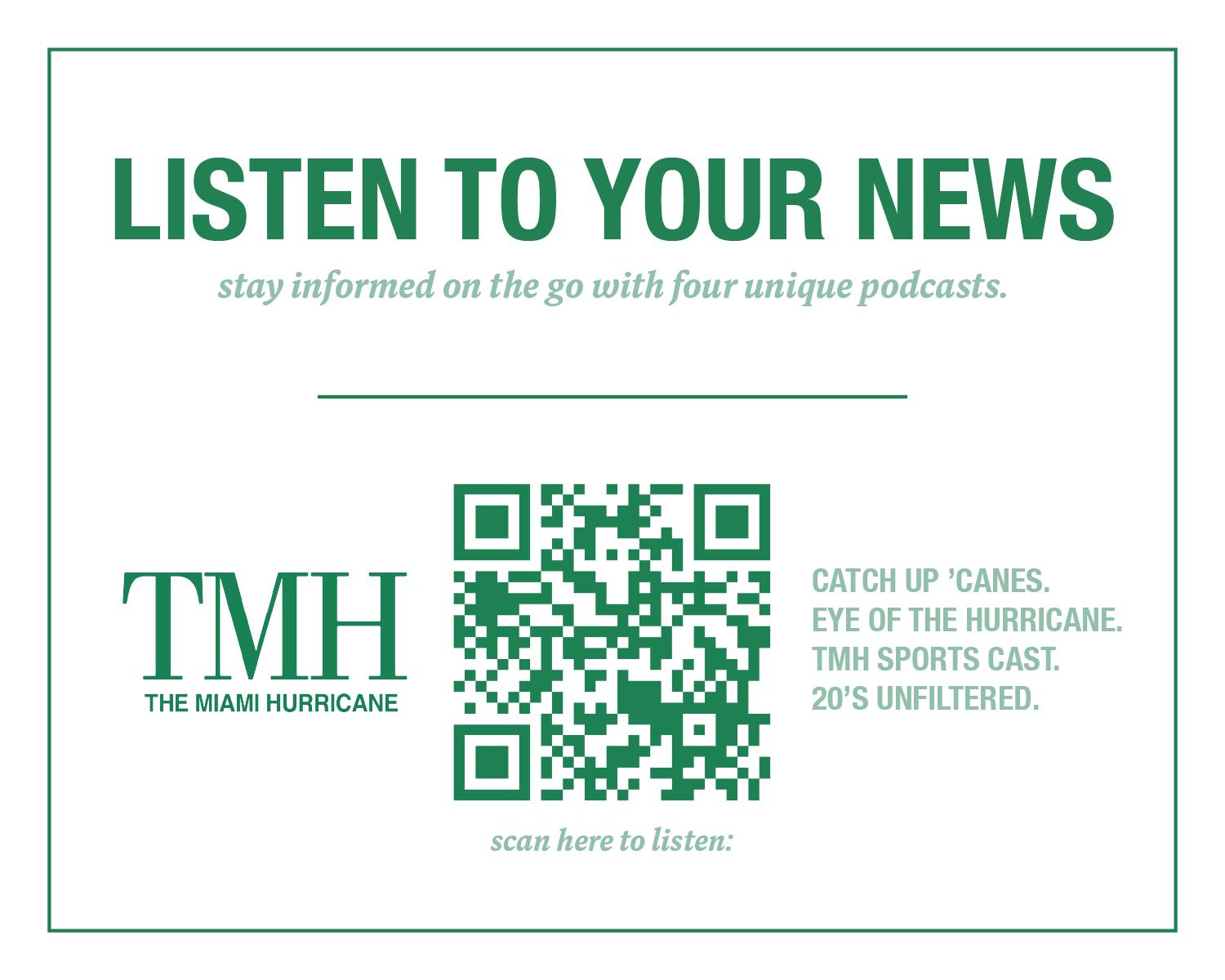
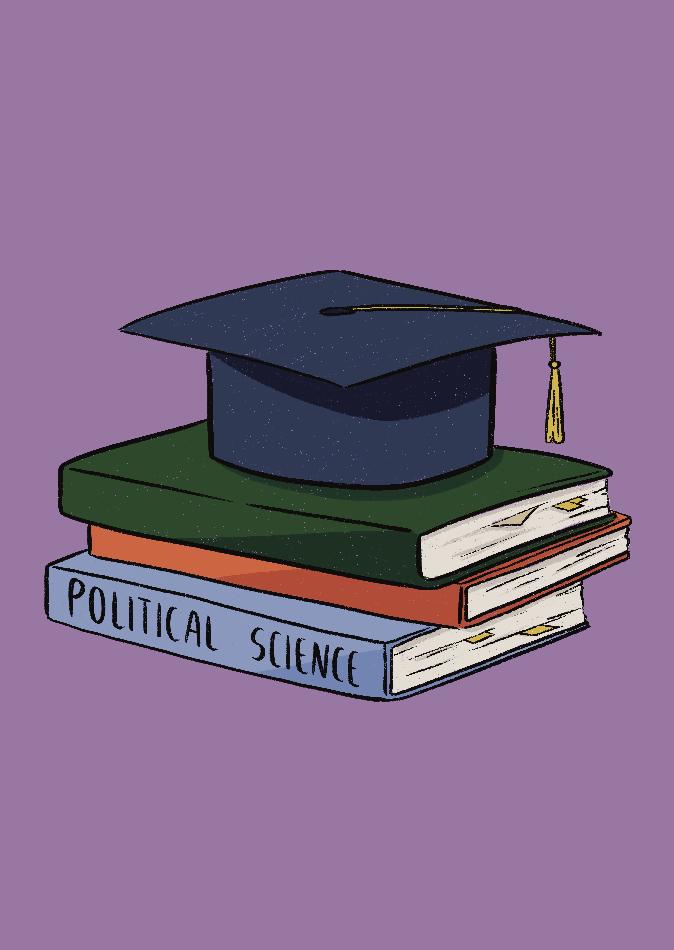
don’t expect engineers to design bridges without physics or biologists to conduct research without understanding the scientific method,” Long said. “Why should citizens be expected to make decisions about democracy without ever studying how it works?”
A student who wishes to remain unnamed says she feels “constrained by all the other mandatory classes,” especially as a freshman in courses like writing studies and math.
Students already face many requirements with their majors and cognates, so one more class may feel burdensome. But this course could be integrated into existing social science or writing requirements, not added on top.
Others who oppose adding a political science requirement worry that not every student is interested in politics or the humanities. A well-designed class would not be partisan or ideological. It would be about literacy, not persuasion. In fact, teaching politics in a balanced way helps reduce polarization and equips students to resist extremism.
For those who think UM students are already knowledgeable enough, data from the National Chamber
Foundation says otherwise. In the current state of our nation, we must take preventative measures to not become a part of the problem. Passion without process is not enough — a political science course will empower Miami’s students to be more civically engaged.
The University of Miami is uniquely positioned for this transformation. Miami is a frontline city for climate change, income inequality and immigration, all of which are issues intertwined with politics. Our campus’ diversity makes it an ideal setting for comparative discussions. By embedding civic learning into the UM experience, the university would strengthen its reputation as a civic-minded institution aligned with its mission of preparing students to be engaged global citizens.
Civic literacy is not optional, it is a responsibility. A required political science course would be an investment not just in UM students, but in Miami and democracy itself. The Faculty Senate, administration and Student Government should pilot this requirement and students should demand it for the health of the democracy we will inherit.
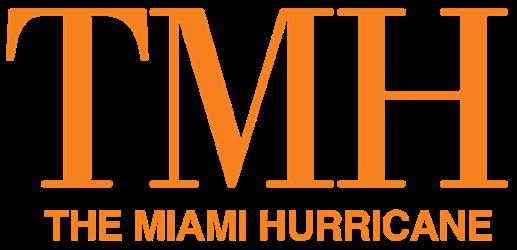
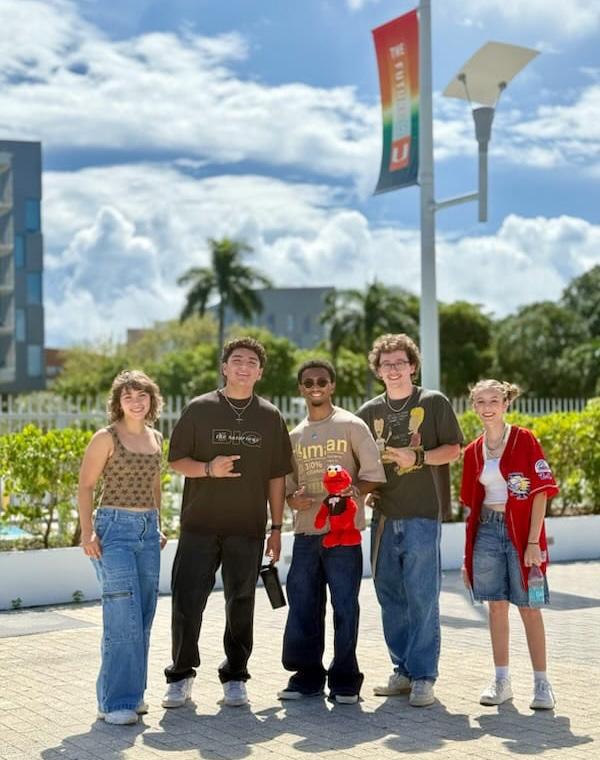

By
It’s hard to miss Shelton Douthett decked out in a complete ’Canes football uniform in the stands at Hard Rock Stadium.
The 37-year-old Miami Gardens native goes all out for the ’Canes every home game. You can say it’s because he’s one of the biggest UM fans, but it’s also because he’s a bigger fan of his brother, who passed away 16 years ago.
The brothers had gone to home games since the 1990s when his mother Gloria was given tickets in return for doing a security detail at the Orange Bowl. Wayne Kevin Dothett Sr., Shelton’s dad, took him and his brother, Wayne Jr. to a Miami vs. Syracuse game.
“It was like, love at first sight, and ever since then, it’s been all ’Canes, all the time,” Douthett said.
After years of home games, Shelton and Wayne took their first away trip to the Miami vs. FSU rivalry game in 2009.
“We won that game — Jacory Harris led that comeback in the fourth quarter. It was such a special moment, because that game ended up being the last one my brother ever saw alive.”
After the game, his brother Wayne was hospitalized with a case of pneumonia.
The brothers watched the Miami vs. Georgia Tech game a few days
By Ariana Glaser Contributing Writer
Junior Kaleb Beek realized there was a lack of R&B and hiphop at the Frost School of Music in fall of 2024. He and two members of his class, Natacha Chacin and Ethan Bowden, decided to change that last October.
The trio performed a sample R&B and hip-hop set during their contemporary studio class. Afterwards, the eager artists told their audience they were still searching for a drummer and bassist. Bass player Isabella Heck and drummer
Mateo Gaviria jumped on board and Poster Child was born.
A year later, Poster Child is gearing up for its biggest performance yet: opening for the University of Miami’s Centennial Homecoming concert on Nov. 9.
Several student-led bands competed in “Battle of the Bands” for the chance to open for A Boogie Wit da Hoodie, the highly-anticipated headliner for this year’s Homecoming concert. Students voted for their favorite band, and Poster Child came out on top.
“Everybody else in the band had stuff that they had to imme -
diately do after we played, so I was the only one still there,” Beek said. “I really wasn’t expecting it, but I was so incredibly excited.”
Poster Child is no stranger to the stage. The upcoming Homecoming concert may be the band’s biggest gig to date, but it’s far from its first. The band played their fair share of gigs at local venues and on-campus events, including the Titanic Brewery and Patio Jams.
Their performances radiate electricity. Beek is usually at the forefront, though he never stays in one place for too long. He raps with a soulful motivation laced in every step and every word.
He trades vocals with Chacin, who offers indie melodies while moderating the keyboard.
To Beek’s left, Bowden keeps the beat and the background consistent with his guitar and Heck punctuates rhythm whilst her fingers sing across her electric bass. Last but not least, Gaviria keeps the music lively with his quick skills at the drumset.
Sometimes, they’re accompanied by their “hype-man” — a small, animatronic Elmo doll.
While the songs Elmo sings don’t quite fit with Poster Child’s current repertoire, there’s always room for him to learn. After all, the band members each came from their own unique musical upbringings.
“All of us came from very different genres,” Heck said. “I initially was very Motown heavy, and then I started playing this. We all kind of connect through this music, but we all come from very different places.”
Poster Child sought to combine all five members’ stories when choosing their genre and theme.
According to Bowden, they settled on “a live, sort of rock or indie band [with] a modern-day hip hop rapper over it.”
For most of the members, join -
ing Poster Child marked their first time performing as part of a group. That meant that apart from perfecting their own musical skills, they had to learn how to collaborate — a skill which has proved to be extremely rewarding for all of them.
Though many members are solo artists as well, they have been able to join forces to improve musical storytelling through collective instrumentation and new perspectives.
Of course, it isn’t always smooth sailing. They have creative disagreements and rehearsals where lyrics just don’t come. One of the most prevalent struggles they collectively face is time management.
“Yes, I’m busy. Yes, I feel like I’m running around like a chicken without a head, but I’m doing music,” Beek said. “This is what I’ve dreamed of doing my whole life. I can’t be anything but grateful for it, you know?”
The band has reached heights none of the members could have ever predicted. They perform regularly, and they’re well-known across the Frost School of Music. But apart from musical fulfillment, they’ve gained something far greater through their involvement: a group of friends.
“Something I’m surprised about would probably be how fast we clicked together in the sense of how well we get along with each other,” Bowden said.“It can be something that we can all enjoy. I feel like we definitely built a kind of family vibe.”
What’s next for Poster Child?
Ahead of Homecoming, they’re finalizing the mastered recording for the first single entitled “Miss Misfortune,” which they hope to release in the coming weeks.
Don’t miss Poster Child’s grand performance at the 2025 Homecoming Concert, which will take place at 7:30 p.m. on Nov. 4, 2025 at the Watsco Center.
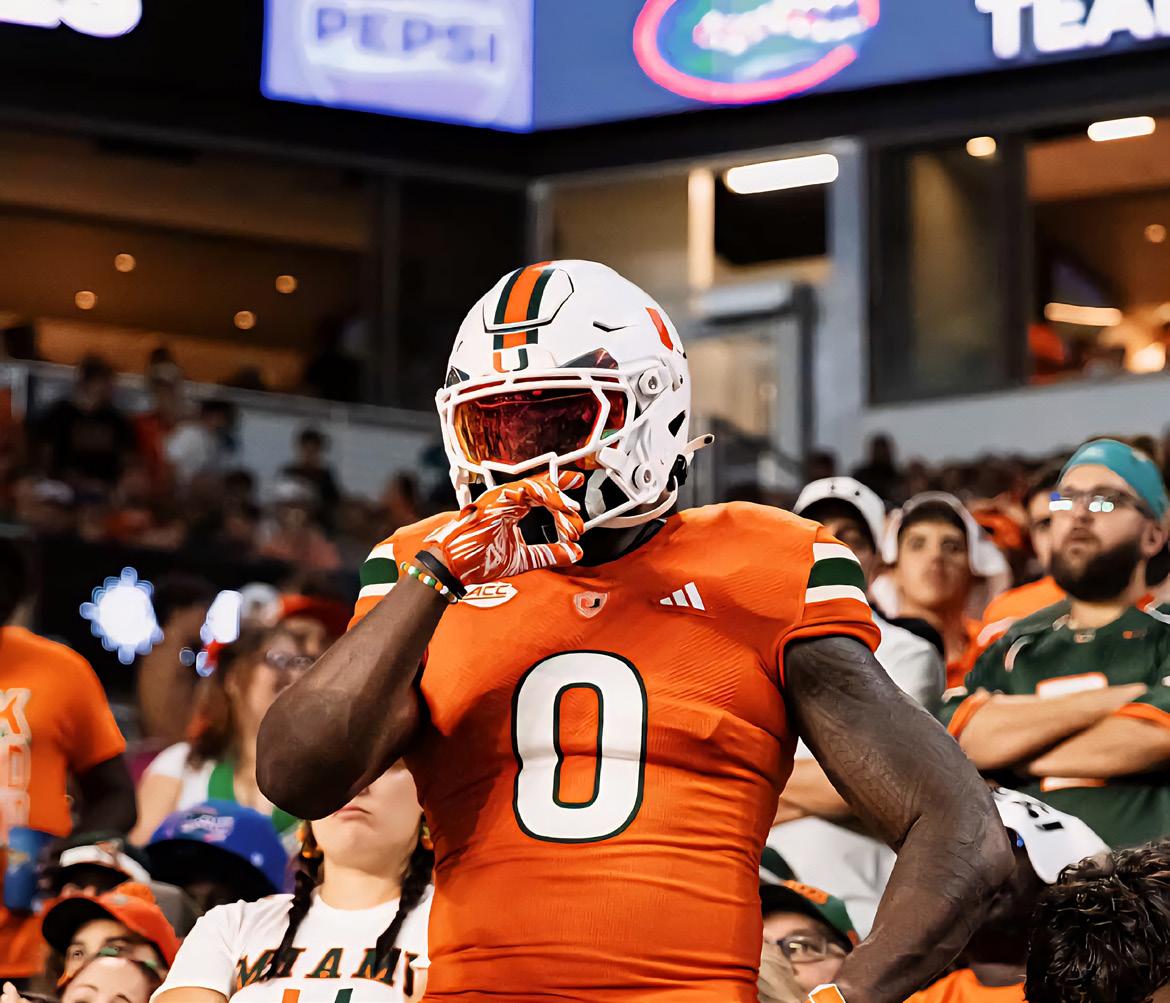
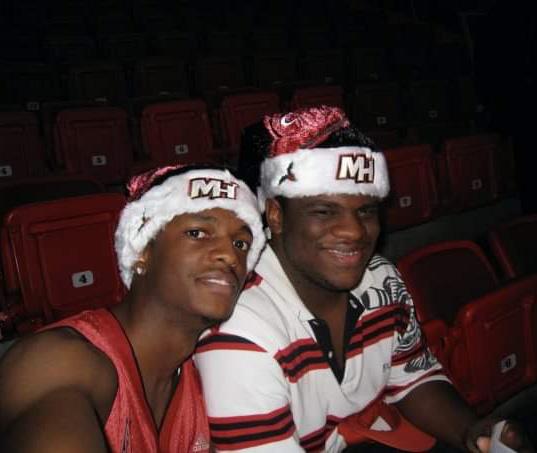
later on the TV in the hospital room while Wayne was being treated. That moment led to Shelton making a promise he would never forget.
“He pointed to the TV, and I was trying to get him to say [what he wanted] in his own words, because he was mentally handicapped,” Douthett said. “And I was like, ‘You know what? As soon as you get out of the hospital, I’ll wear [the ’Canes football uniform] to one game with you.’”
Wayne was discharged from the hospital, but the fluid returned to his lungs days later and he was readmitted to the hospital.
On Oct. 17, 2009, Shelton received a phone call at 3 a.m. that changed everything. Doctors told him Wayne had passed away.
“I felt lost, because my brother was my best friend,” Shelton said.
“Even though he had a mental disability, I really didn’t see that. I just saw him as my brother.”
In the weeks after his brother’s death, Shelton said he felt lost. Between college, a full-time job, and long nights spent at the hospital, life suddenly felt empty without Wayne beside him.
The Douthett family created the Wayne Kevin Douthett Jr. Memorial Scholarship foundation, which benefited the school that supported Wayne throughout his life. But Shelton wanted to find his own way to keep his brother’s memory alive.
Shelton decided to keep his promise. Later that year, he drove up to Orlando to watch Miami play Wisconsin. He was filled with butterflies, and when he got to the game, dressed
“When I suit up, it’s almost like he’s giving me a hug. He comes with me every game in spirit.”
Shelton Douthett
in a ’Canes football helmet, jersey and shoulder pads for the first time, he had no idea what was to come.
“I was a little nervous and I got a lot of stares,” Douthett said. “But
once I told them the story, I ended up with almost $500 in donations for my brother’s scholarship fund. And the rest is history.”
Now, 16 years later, he is still turning heads in the stadium and inspiring more than 11K followers on his Instagram, @da12thman.
Over the years, Shelton has collected custom made cleats marked with the phrase “gentle giant,” and an official ’Canes No. 72 jersey. The 72 jersey was the ’Canes jersey number Wayne would wear to games and the one he was buried in.
“When I suit up, it’s almost like he’s giving me a hug,” Shelton said. “He comes with me every game in spirit.”
This year, Douthett lost another ’Canes fan who had inspired him his whole life. In August, Douthett’s father, Wayne Sr. passed away. Both Waynes are buried together, and both in their ’Canes jerseys.
Wayne Sr.’s funeral was held on Aug. 30, the day before UM’s home opener against Notre Dame. Shelton grieved in the best way he knew how — by attending the game. His father’s family came down for the funeral and supported him as he got dressed for the game.
“Its been really hard these past few weeks,” Shelton said. “But I get to share the love I have for my brother and for my father with everybody I come in contact with.”
Both the UM community and rival fans have embraced him and his mis-
sion of continuing his family’s legacy.
Some parents have even told him he’s a big reason why their children have grown into ’Canes fans. And he’s heard all of the jokes before — that someone missed the bus, or people questioning why he’s not on the field warming up. When he’s caught at a tailgate eating, he jokes to people that he has to get in his protein.
Through it all, his family has been his foundation. He describes his mother as an “unwavering rock of support,” and he says his sister, though she lives in Tampa and is an Auburn fan, supports him every step of the way. His wife, Jacqueline, has embraced the tradition, too.
“She’s my backbone in everything that I do,” Shelton said. “When we started dating, I told her ‘Oh, by the way, this is what I do with my Saturdays,’ and she said “Oh, I already knew. I Googled you.’”
The tradition has become bittersweet. It reminds Douthett about the happiest memories he had with his brother and father and also how he can’t make new ones with them.
He leans on the support of his family and his community when things are extra tough, knowing that every laugh, photo and memory keeps their spirits alive.
“I’ve thought about stopping sometimes, but something always tells me, ‘Keep going,’” Douthett said. “I love making people smile. And this is how I honor my brother.”

more of a driver to car connection than most cars out there.”
Founded in 2023 by Parker Fallesen and Jakob Brown, the club began as a small Snapchat group chat and has evolved into an official campus organization. The club now has more than 600 Instagram followers and 200 active members.
Vice President, Ashton Yadegar, said the club’s first car meet had about 10 to 15 cars, but now they average 25 to 30 each meet.
“I’ve been here the past few times and I’d say it’s definitely a great experience, not only the nice cars you see in the parking lot, but it’s people to talk to. It’s a community,” said Alvand Fallahi, UShift member and photographer.
One of the flashiest cars at a meet was a decked out 2024 Toyota Supra owned by Gabe Ruiz, a faculty member of the Miller School of Medicine who also completed his residency at UM. Ruiz discovered UShift from an Instagram post sent to him by his daughter, who is a freshman at UM.
“There are a lot of young people, which I love and I’m starting to see really nice cars,” Ruiz said. “The car community in college is something that I didn’t know existed, but it’s great that
people are growing up with their cars and keeping their cars.”
The club’s executive board, including Crozier, Yadegar and Treasurer Ciara Bower, plan to expand the group’s activities beyond monthly car meets.
They are currently seeking University funding to host go-karting days, private collection tours and trips to a racing simulator in Wynwood. With this funding, they hope to host these events with discounted rates for these experiences to students.
UShift, UM’s automotive club, is the first club of its kind designed specifically for UM students and alumni.
Although the club is only two years old, it has rapidly grown in popularity and hosts monthly car meets in the red parking lot near the University’s school of communication.
UShift welcomes any UM student or alum who wants to learn more about cars or show off their own vehicles.
Max Crozier, UShift’s president, displays his 2017 BMW M3 Comp with Eventuri intakes, Eventuri charge pipes, upgraded intercooler, BBS wheels and a GAD wing at the meets.
“It was built for the racetrack, really, and it just feels like it has a soul, but a lot of cars don’t,” Crozier said. “There’s
The club hosts five car meets per semester, held monthly on Wednesdays from 8 p.m. to 10 p.m. Information about specific dates can be found on their Instagram or Engage page.
“I love cars. I love my car, too. And I thought I might as well come and see what other cars are around, get out a little bit,” said Alvaro Bayer, senior UShift member and car owner.
The meets are a chance to look at cool cars, but they are also an opportunity to reconnect with the UM community
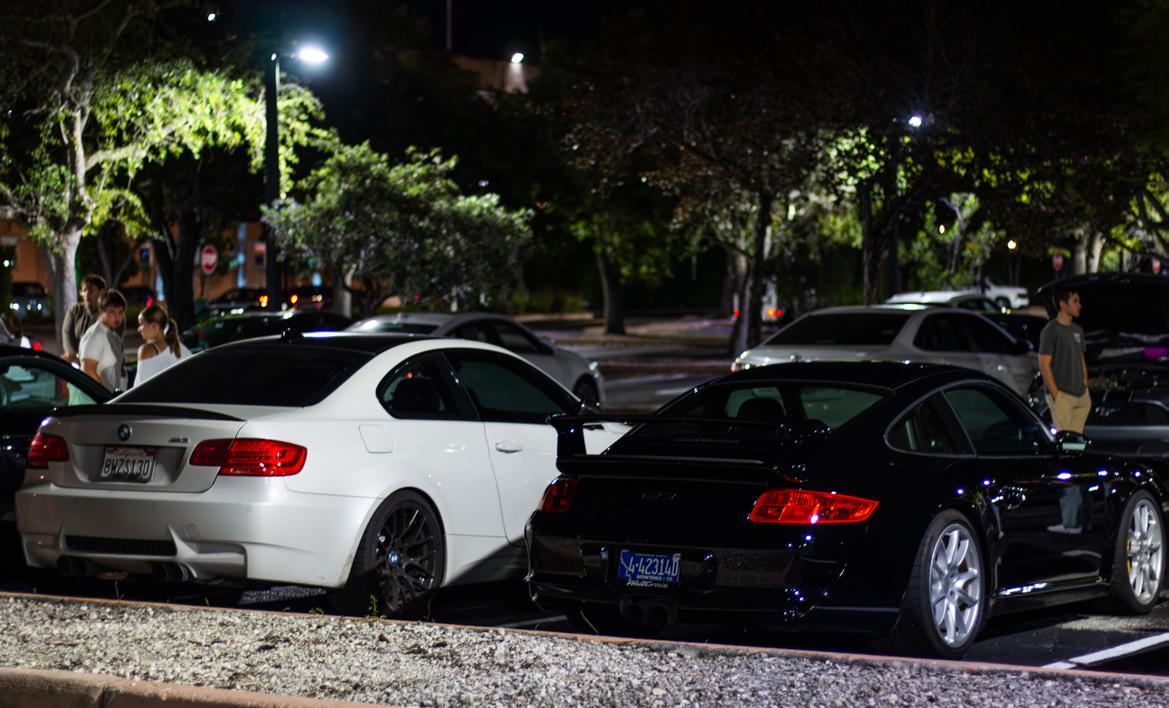
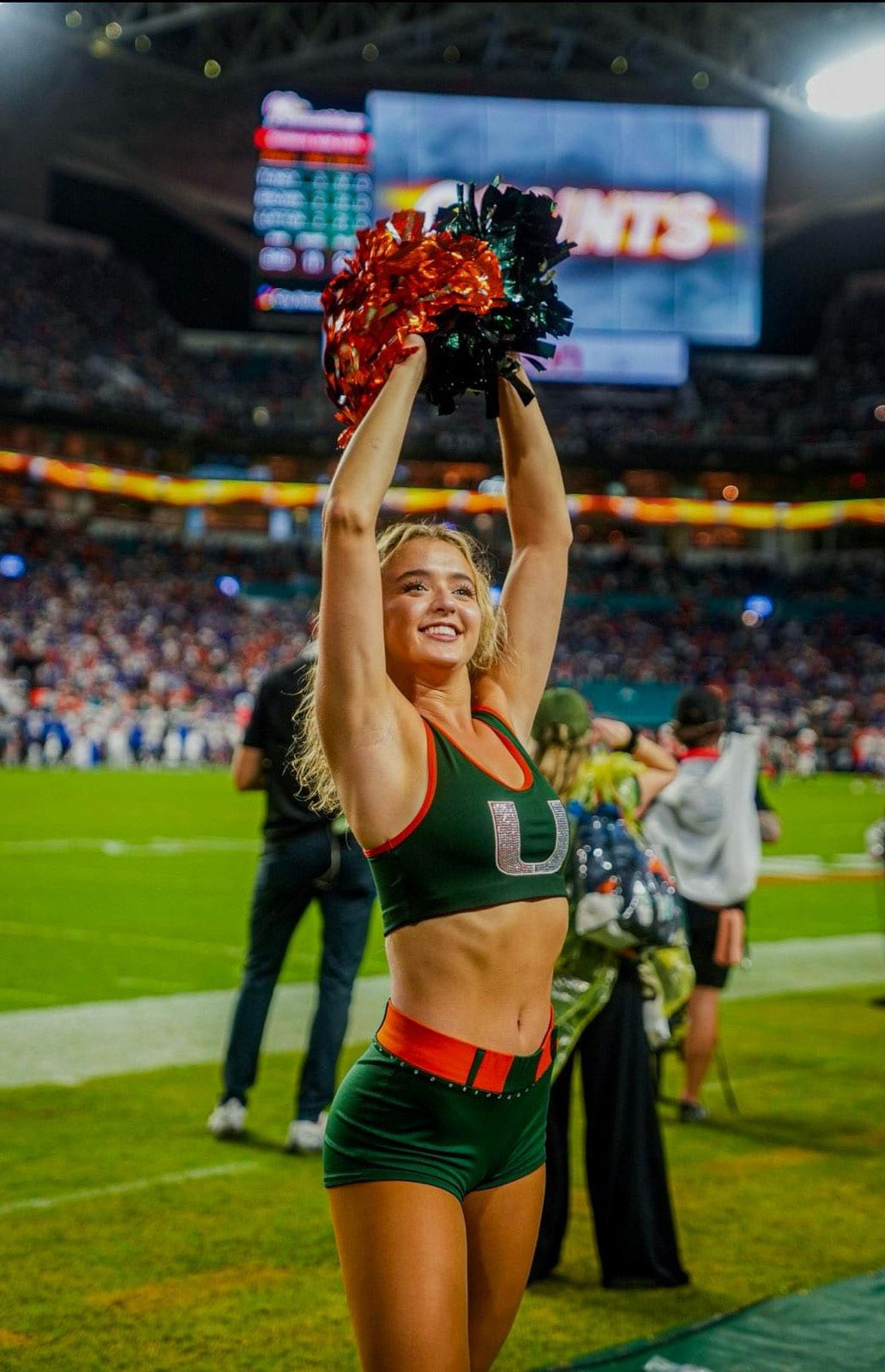
Ava Liber Contributing Writer
The moment the music starts, Hard Rock Stadium erupts, drums skating, crowd roaring, lights blinding. The kind of adrenaline that would send most people straight into a blackout. But for freshman Brooke Walsh, it’s where everything clicks into place.
“You look up and see thousands of people cheering,” Walsh said. “It’s one of the best feelings ever.”
Walsh is a journalism major from Chicago and one of eight newcomers on the 23-member Sunsations team this season. She has been dancing since she was three years old, but college-level performance brought an entirely new routine.
“Sometimes it’s hard to balance everything,” Walsh said. “But I try to find pockets of time for myself, put away my phone and stay focused on school. Dance is when I get to let loose.”
Her weekly schedule is intense: lifting sessions at 6 a.m. on Mondays and Wednesdays, practices from 6:45 p.m. to 10:30 p.m. three nights a week and full-day game days every Saturday.
With the Universal Dance Association national championships approaching in January, the Sunsations have added long Sunday practices to clean up choreography for their jazz and hiphop routines.
“We’re not under the NCAA, so we don’t have limited hours,” Walsh said. “People don’t always realize how much work we put in, we’re athletes too.”
Game days start long before kickoff. If the game is at 7 p.m., Walsh and her teammates are on the bus by 2:15. They start getting ready around noon, warm up, mark routines on the field, eat Chick-fil-A in the Dolphins’ cheer room, take photos and then join the band and cheer team for Hurricane Walk. With so much time spent practicing,
“I’m just so grateful. Being here, doing what I love — it’s everything I hoped for.”
Dancer
traveling and performing together, the team formed a close bond.
“I felt accepted really fast,” Walsh said. “We spend so much time together, it’s like an instant bond. Even as a rookie, I never felt out of place.”
She credits head coach Jonni Rodgers for building a culture where dancers feel supported, not just pushed.
“She’s unlike any coach I’ve ever had,” Walsh said. “She’s both a coach and a friend. I can tell her anything. It makes me feel more connected to the team.”
Homecoming Week brings a special kind of excitement. Alumni dancers return to perform alongside the Sunsations, sharing the sidelines and the ’Canespride.
“It’s such a full circle moment,” Walsh said. “You realize how much being a Sunsation means to people.”
Her proudest moment so far came at the Notre Dame game when ESPN College GameDay featured the team.
“Seeing myself on TV was crazy,” Walsh said. “People were texting me and I was like, ‘Wow, this is real.’”
Walsh hopes to continue dancing beyond college — and maybe on an NFL cheer team like the Miami Dolphins, where many of her coach’s connections could open doors.
Still, Walsh remains grounded in the present, balancing her journalism studies, dance commitments and the joy of performing for her school.
“I’m just so grateful,” Walsh said. “Being here, doing what I love — it’s everything I hoped for.”
For Walsh, every eight-count and each step onto the field, is proof that passion and perseverance can coexist.
“When I’m out there,” Walsh said, “I know I’m exactly where I’m supposed to be.”
While students count down the minutes to the big game, freshman cheerleader Ryen Mandell is preparing for her biggest performance yet.
Mandell is a freshman from Toronto who’s been dancing competitively since age seven. It had always been her dream to attend the University of Miami. After taking a two-year hiatus to focus on her
studies, she was accepted to the University, auditioned for the Hurricanettes and earned a spot on the team.
Despite being new, Mandell always felt welcomed by the cheer team.
“The first night that I walked in, I felt enveloped by the group,” Mandell said.
“Every single person on that team is so sweet and so loving.”
She’ll be performing at several events with her team this Homecoming like the Hurricane Walk Pep Rally, a volleyball game, an Alma Mater competition and,
of course, the Saturday football game.
Cheering for UM out on the field makes Mandell “extremely proud to be part of the school,” but it’s no walk in the park.
Mandell typically needs to arrive at practice at 6 a.m, making her week long and the days longer.
“Our amazing captain preps us so well, with a to-do list before practice or game day,” Mandell said. “I pack my bag up the night before, so I’m calm and ready.”
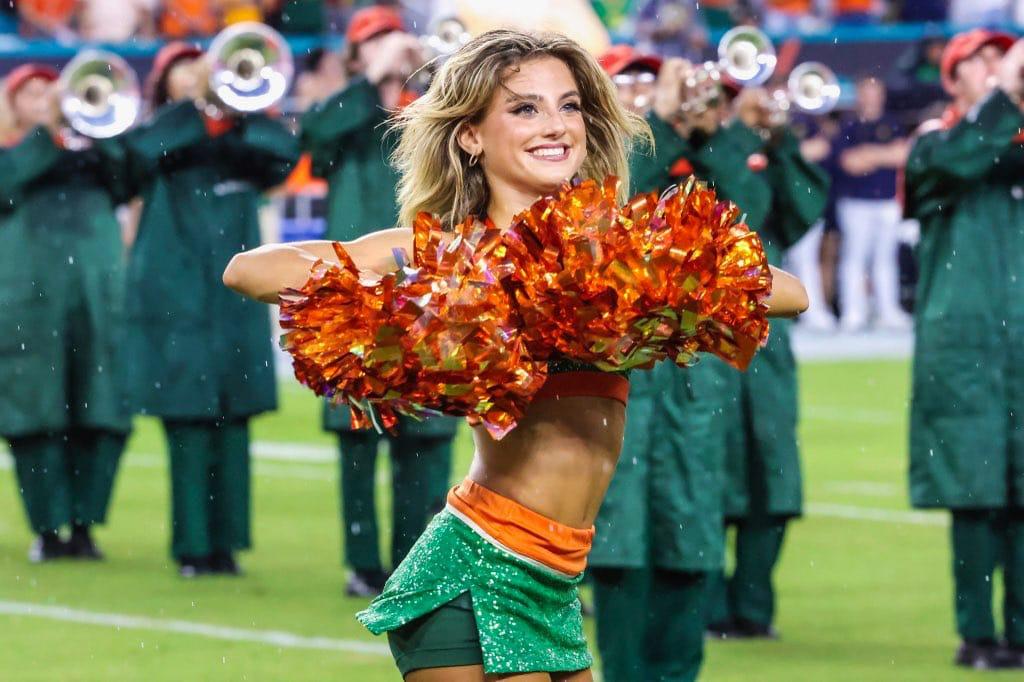
Even in her free time, Mandell trains to become a better dancer and up the ante at any University event.
“Our videos from practice are set and we have to review it and practice and make sure you are showing up for your team as much as they are showing up for you,” Mandell said.
With her dance background, Mandell is used to the pressure, but nerves still hit before a performance until the adrenaline takes over. But, Mandell takes comfort in knowing her fellow
Hurricanettes have her back. The team encourages one another every step of the way.
“We perform not because we’re trying to win something or gain anything,” Mandell said. “What we gain is our friendship. It’s the value of the team that pushes us so much.”
Catch Ryen Mandell and the rest of the Hurricanettes on Monday as they welcome the football players. And if you can’t make it, no worries, they’ll be here all week.
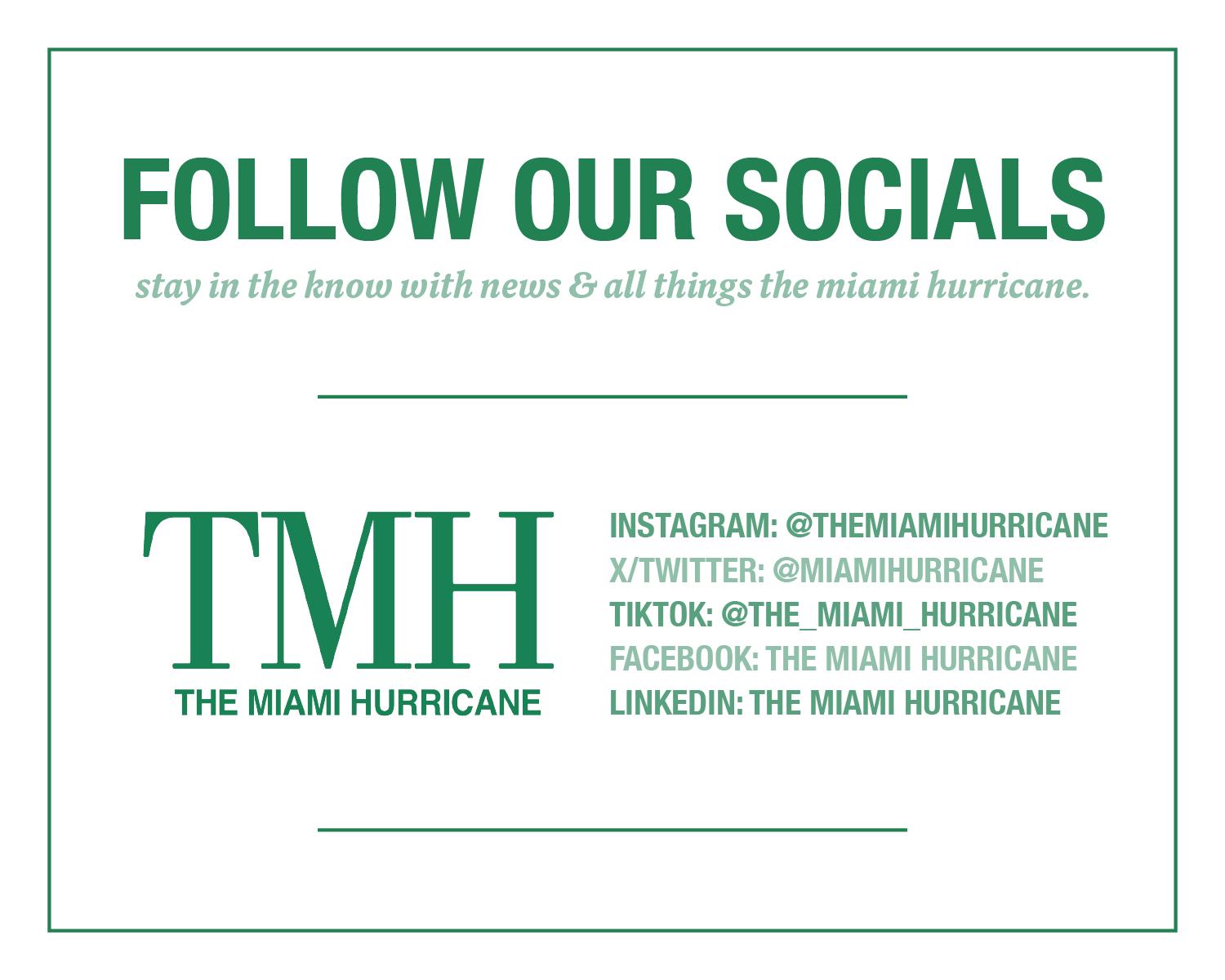
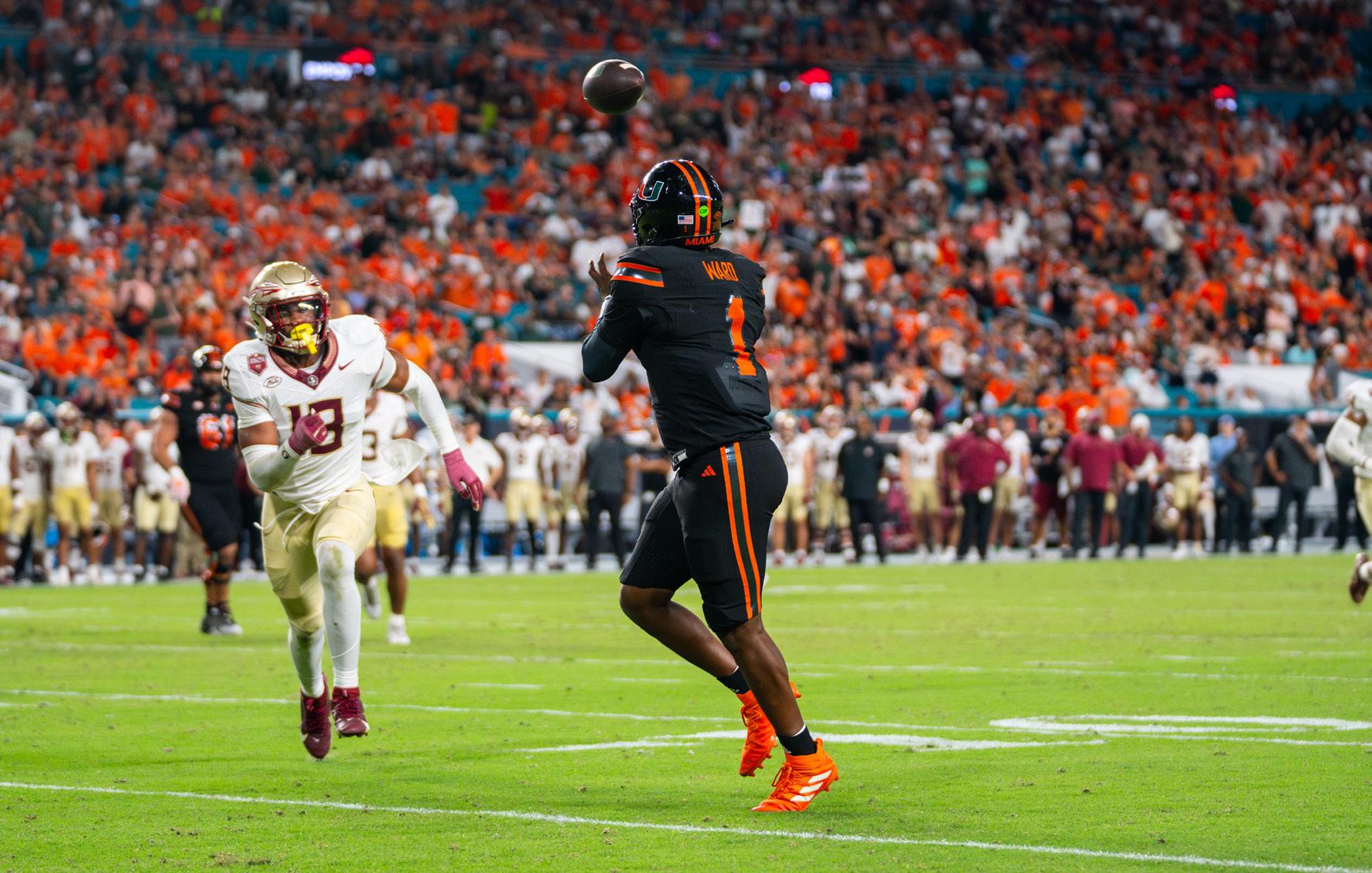
witness the blazing ritual.
Though environmental concerns eventually extinguished the annual flames, that same passion and pride continue to define Homecoming today.
Just like a cool breeze and changing leaves, Homecoming at the University of Miami arrived like a change in season belonging entirely to the Hurricanes.
The campus glows in orange and green hues. The Band of the Hour echoes through the palms. Alumni return to campus and reminisce about “the good old days” — back when they were 20, sunburnt and believed in everything.
That same spirit has burned bright dating back decades.
In 1956, Student Union Director Norman A. Whitten sought a unique way to commemorate the 30th anniversary of Homecoming at the U. New to campus, the Theta Chi fraternity took up the challenge and started the tradition of boat burning on Lake Osceola.
Legend had it, if the boat’s mast fell into the water before the boat sank, Miami would win the game. Thousands gathered every year to
It’s a week where time stands still — and Hurricanes of the past and present orbit around one shared heartbeat: Miami football.
At UM, Homecoming isn’t just another game. It’s a sacred spectacle tying together tradition, community and the unbreakable spirit of the U. Though football is at the center, Homecoming is more than a matchup. It’s a celebration of community and belonging — a reminder of how sport connects people to something bigger than themselves.
In recent years, Homecoming has brought both drama and defining moments, including a double-overtime victory in 2023 and a rivalry win in 2022 that sparked a late-season surge in performance. Last season, Miami crushed in-state rival Florida State 36–14 demonstrating dominance and marking their first win over the Seminoles since 2020.
On Nov. 5, Miami will host the Syracuse Orange at Hard Rock Sta-
dium for one of the most anticipated games of the season. Syracuse handed Miami one of its most frustrating losses of the 2024 season, overcoming a 21-point deficit to stun the Hurricanes 42–38. That collapse derailed what had been a promising campaign. This year, Miami has the chance to rewrite that story, and there is no better time to do it than Homecoming.
Kickoff is set for 3:30 p.m., and the stakes are high regardless of revenge hopes.
Although the Hurricanes won their first five games, three of which against ranked opponents, their recent loss against Louisville sent them tumbling down the rankings from No. 2 to No. 10 in the nation.
For Miami, the matchup is about more than just maintaining its winning record. A win over Syracuse would keep Miami atop the ACC and sustain its national momentum heading into the final stretch of the regular season. The Orange play fast, capitalize
on errors and have proven they can come back from behind. If Miami wants to avoid another untimely collapse, consistency will be key — finishing drives, limiting penalties and keeping composure through the middle quarters.
Beyond tactics and stats, Homecoming at the U is about atmosphere. It’s about alumni filling the stands, the band echoing through Hard Rock, the flash of orange pompoms and the electric hum of UM’s illustrious history.
The Hurricanes have the talent and the track record to keep their impressive run alive. But as Miami knows, records don’t win games — execution does.
Still, there’s something about Homecoming that feels different. It’s pageantry defending the school’s honor. The lights are brighter. The noise is louder.
The moment is bigger.
Because Homecoming at the U isn’t just about coming home — it’s about standing tall once you’ve arrived.
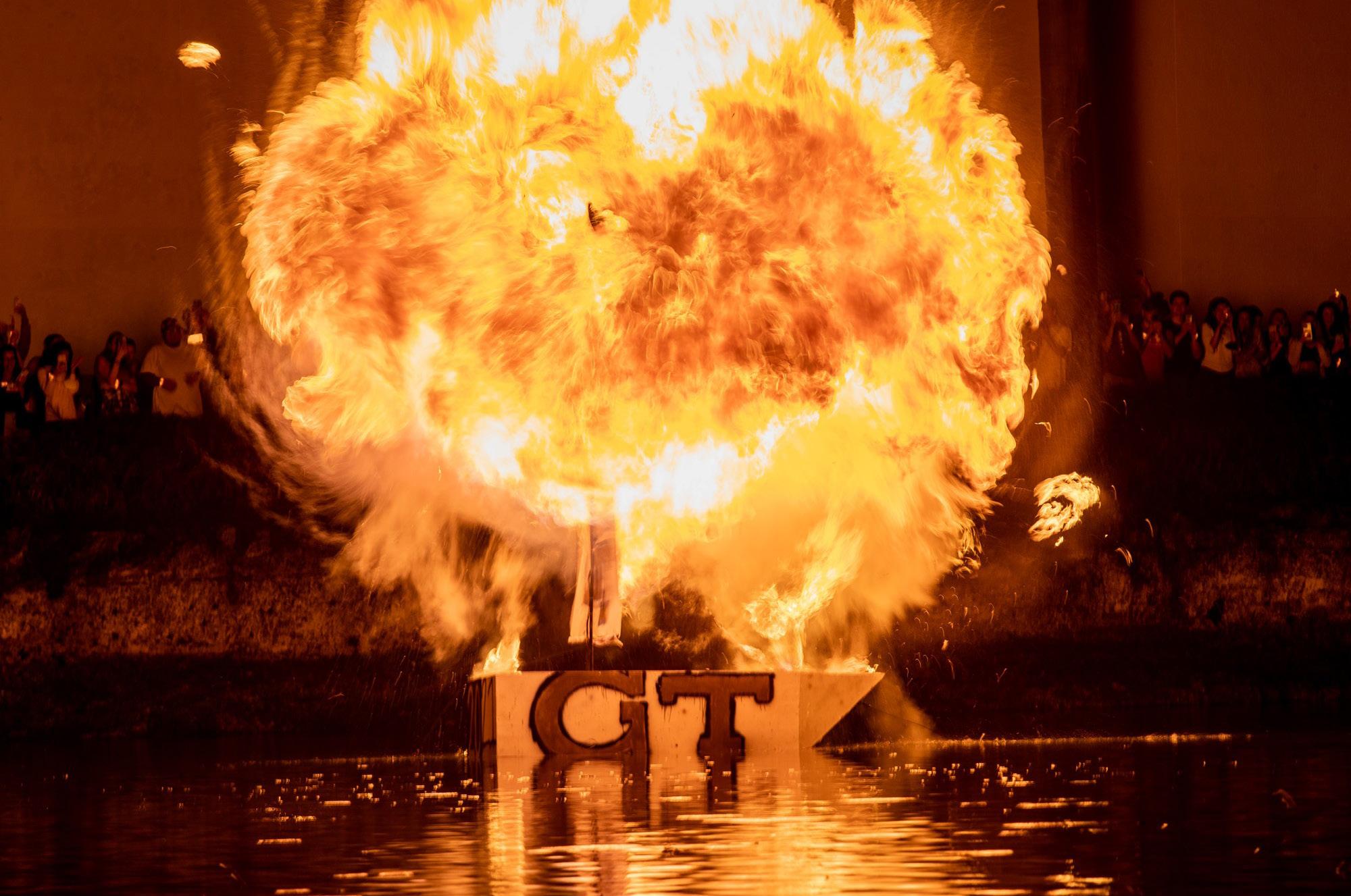
Shea McDonald Senior Staff Writer
On Saturday, the Miami Hurricanes left Florida for the first time this season and came home empty-handed, losing in Dallas 26-20 to SMU in overtime.
On third-and-goal at the SMU seven yard line, Miami quarterback Carson Beck threw a back-breaking interception at the goal line, giving the Mustangs (6-3, 4-1 ACC) a chance to win their first top-10 victory at home since 1974.
In the ensuing possession, running back T.J. Harden punched in a one-yard touchdown to take down the ’Canes, as fans stormed the field.
Miami now falls to 6-2 on the season and has lost two of its last three games, marking another disappointing November loss. Head coach Mario Cristobal is now 4-11 in his Miami tenure in the months of November and December.
With four games left in the season, UM needs to make changes to end this season on a positive note.
Playoff hopes likely gone
The Hurricanes were the No. 2 team in the country on Oct. 5 and vying for the best team in the nation. Less than 30 days later, Miami’s season is all but over.
With two in-conference losses, the Hurricanes likely lose out on all hope to make the College Football Playoff.
Other two-loss hopefuls like Notre Dame and Vanderbilt, for example, will likely get the bump over Miami with losses coming against ranked opponents.
Georgia Tech falling to NC State would have opened the door to the ACC Championship, but Miami could not hold up their end of the bargain. Now UM will need SMU and Louisville to lose multiple conference games in order to jump them in the conference standings. Even if things fall into place for Miami, the Hurricanes still need to win out. With 7-2 Pitt and a frisky NC State team, going undefeated the rest of the season is far from a certainty.
Sitting at No. 18 in the Week 11
AP Poll with no ranked opponents left on the schedule and two losses
in an average conference, it will take a miracle for the Hurricanes to make the CFP.
The College Football Playoff show will make its first ranking on Tuesday, giving the ’Canes an estimate to their chances of making the playoffs. In all likelihood, everything points to another year with Miami falling just short. With the most talented team of the Cristobal era, Miami needs a miracle with a month left in the season to sniff any championship.
Penalties continue to be a legitimate problem
The Hurricanes committed 12 penalties for 96 yards. Once again, Miami was sloppy and undisciplined, and it cost them the game.
Whether it was pre-snap penalties, holding calls on the offensive line, or unnecessary roughness after the whistle, Miami again could not get out of its own way.
As talented as this Hurricanes team is, penalties have been a problem all year for Miami, averaging just under 70 penalty yards per game. UM averages the third most penalties of any team in the nation, with 8.6 per game.
At a certain point you can’t overcome being an undisciplined football team. The Hurricanes had calls go against them, and it’s fair to question some of the officiating, but you have to control what you can, and Miami was unable to do that.
Miami has had this issue all year, and it has yet to be fixed. For most of the season UM has gotten away with the sloppiness, but as Saturday and the game against Louisville showed, that is not sustainable.
Everyone needs to look in the mirror
“Just got to be a grown man and face reality,” Cristobal said postgame. “We didn’t take care of business, and that’s completely on us.”
This Hurricanes football team is likely going to fall short of the postseason, and that is the fault of leadership across the board.
With one of the best offensive and defensive lines in the country, a refreshed defense that has yet
to let up 30 points, and more than enough weapons, it quickly became evident that this Miami team could and should have competed for a national championship. Yet once again UM couldn’t get out of its own way.
It’s been the trend since the fourth quarter of the game against FSU. Despite being the superior team, Miami made constant unforced errors that gave a struggling opponent life.
It is the job of Cristobal to keep guys ready to play and disciplined on the field. And as we’ve seen each year as the season wears on, Miami has had these issues derail promising seasons.
Cristobal’s recruiting and team-building prowess has been impressive, building the program up year by year.
Given the quality of the team he’s built, the expectations have grown, and in his fourth year, these
gameday and discipline lapses have to fall on him. But he is not the only one to take fault; Miami’s leaders, both in the coaching staff and on the field, need to get this fixed.
With four games left in the season, changes have to be made for Cristobal and the Hurricanes if they want to end the season on a high.
The ’Canes (6-2, 2-2 ACC) will host the Syracuse Orange (3-6, 1-5 ACC) on Saturday at Hard Rock Stadium. Kickoff is set for 3:30 pm on ESPN.
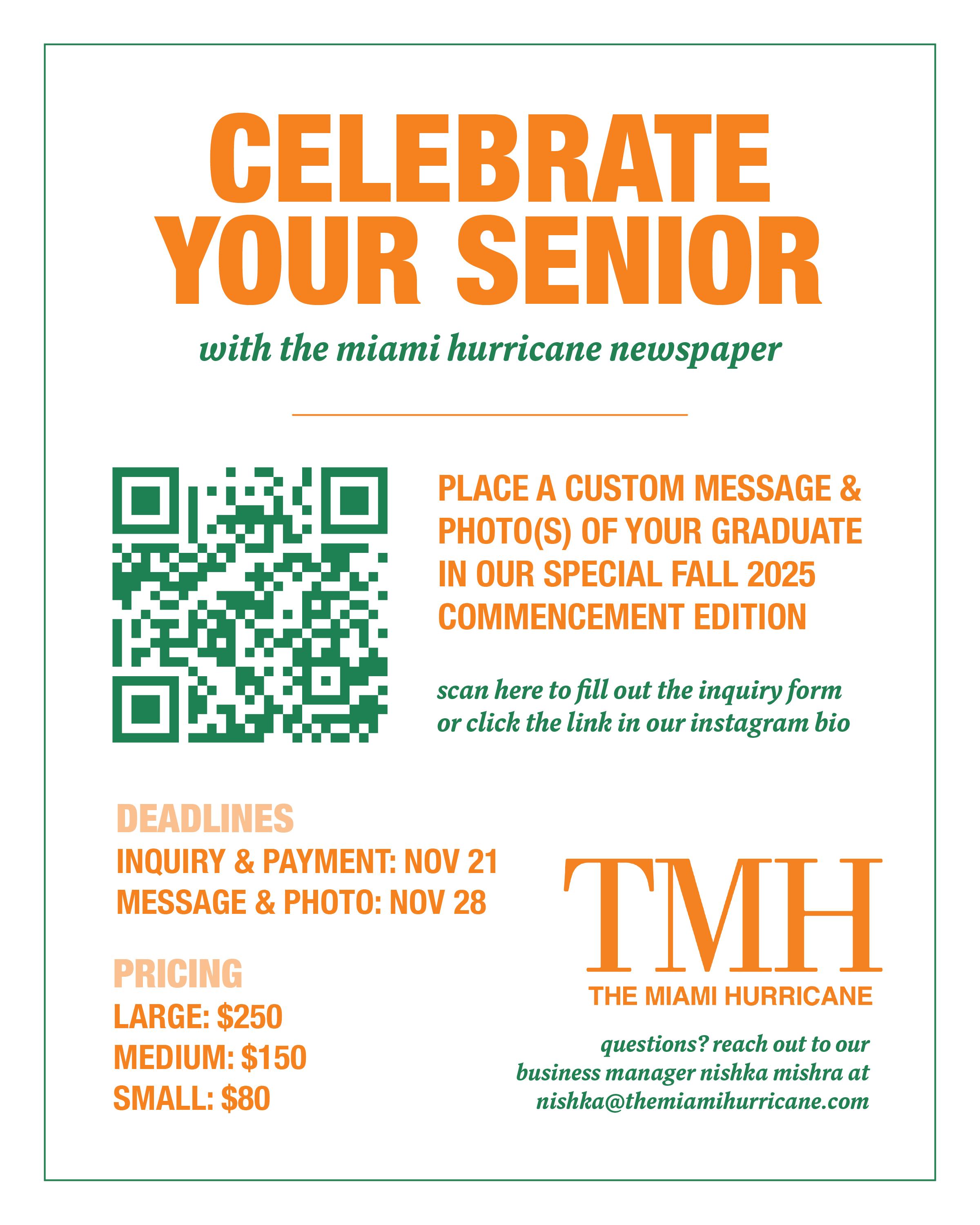
Alyssa Golden Contributing Writer
Guard Tre Donaldson, center
Ernest Udeh Jr. and forward Malik Reneau make up the core of the University of Miami men’s basketball team for the 2025-2026 season.
Beyond their love for the game and desire to win, all three athletes share one defining trait — they are all transfer athletes.
Donaldson played at Auburn and Michigan, Udeh at Kansas and TCU and Reneau at Indiana.
Since its debut in October 2018, the transfer portal has completely reshaped college basketball. By allowing players to join a different team without sitting out for a season, the portal opens a world of opportunities for college athletes.
“It gives us an opportunity to make the best decision for ourselves and our families,” Udeh said.
More than 2,300 men’s college basketball players have entered the transfer portal in 2025. That number reflects a growing trend — one that’s shuffling rosters and redefining team identity across the NCAA.
Behind each of those athletes is a unique story that motivated their decision to transfer to UM.
“None of my coaching staff returned from last year, and that played a huge role in getting in the portal because I didn’t know the staff that was coming into the next year’s team,” Reneau said.
Their status as transfer players isn’t the only thing these three have in common. They all grew up in the state of Florida.
“We take a lot of pride in the state of Florida,” Donaldson said.
Udeh, who attended Dr. Phillips High School in Orlando, understood how important the Flor-
‘Canes
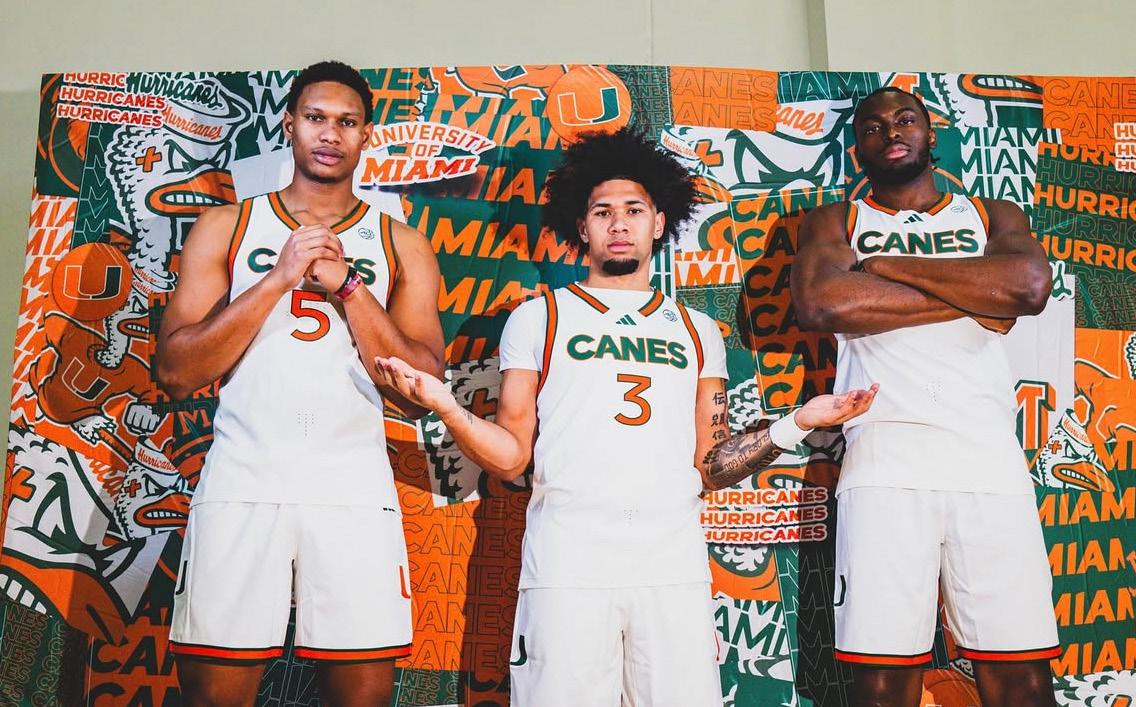
ida ties are for him and his new teammates.
“Being from Orlando, I wanted to come as close to home as possible,” Udeh said. “And after hearing about the recruitment of Tre [Donaldson] and Malik [Reneau], I thought it was pretty much a no-brainer.”
Udeh, Donaldson and Reneau aren’t the only ones on the team with Florida roots. In fact, seven of 13 players on the ’Canes roster are from Florida. That shared geography isn’t just a fun fact — it’s a foundation for chemistry.
“We can all relate to everything being from the same state and playing around in the same tournaments and AAU programs,” Udeh said. “When you’re able to gel with a group of guys off the court, it helps and translates to everything you do on the court.”
“I don’t worry about all the media or the NIL. I play the
like I was 11 years
playing basketball with my friends on the court.”
Reneau
Men’s Basketball Forward
That bond – built through shared roots and experiences – is what keeps the trio grounded as they navigate the pressures of college basketball. For Reneau, keeping the game simple and true to
himself is the key.
“I don’t worry about all the media or the NIL,” Reneau said. “I play the game like I was 11 years old playing basketball with my friends on the court.”
But even with familiar faces and hometown pride, the transition isn’t always seamless.
Transferring does not come without challenges. Players must figure out how they fit into a new group of teammates and staff.
“Getting to know a new team and a new staff [and] figuring out what type of team we were going to be and how we’re going to interact as a team [were two of the biggest adjustments],” Donaldson said.
Transfer players must also learn to integrate into a completely new culture, applying what they learned from previous programs
while adapting to a new environment.
“No matter what program you came from, no matter where you’re headed, you’re always learning,” Udeh said.
Beyond the locker room, transfer athletes face scrutiny from fans and media alike. There is often more to the story than people are quick to assume.
“People see the NIL nowadays and they think that’s what everybody is transferring for,” Reneau said. “In my case, it was super important to find the right play style, find the right guys around me, and the right coaching staff to ultimately develop me to get to my next step.”
As the noise surrounding college basketball grows louder, Miami’s new core is learning to block it all out. For them, success starts with trust: in themselves, in their teammates, and in the process.
“You’re the one lacing up your shoes and going out on that court to play the best basketball that you can,” Udeh said.
“Trust yourself, take your time with it, and don’t listen to the outside noise at all.”
With the men’s basketball season getting underway, the Hurricanes are focused on turning potential into performance. The team’s hopes are set high for the upcoming season, believing they have put in work and are ready to show the world that they are here to play.
“I think the most important thing when it comes down to playing team sports is that ultimate goal of winning the national championship and fighting with your team throughout the whole year,” Reneau said.
For Miami’s transfer trio, the journey may have started on different courts, but now, they’re lacing up for the same fight.
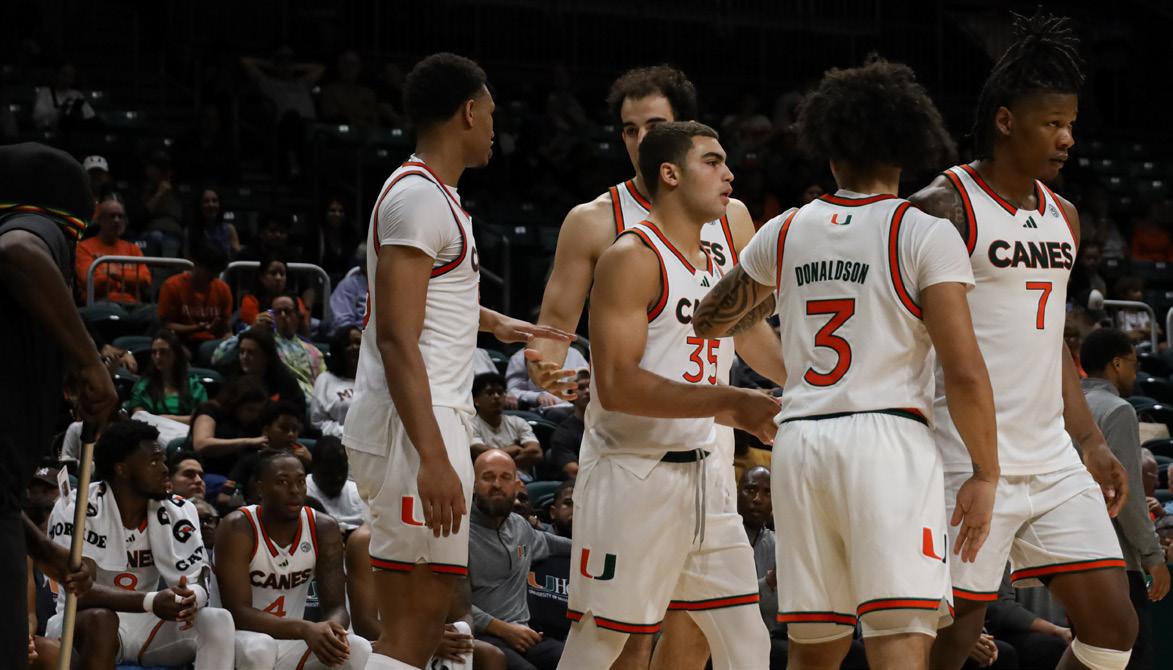
against it.”
The opening to the Jai Lucas era of Miami men’s basketball started slow, but broke free in the final minutes as the Hurricanes took down the Jacksonville Dolphins 86-69 Monday night at the Watsco Center.
As the more talented team, Miami displayed flashes of dominance early on, forcing deep threes by Jacksonville and powering through the Dolphins on fast breaks in the paint.
But JU didn’t falter, as back-to-back offensive blunders by the Hurricanes led to two three-pointers in return, setting the Dolphins up 9-6.
The first half progressed much the same, with Miami fighting for points in the paint, but occasionally turning the ball over and Jacksonville capitalizing with threes and points in transition.
After the game, Lucas spoke on the reasoning behind the team’s first half struggles and inability to pull ahead.
“We had prepared a course against the 2-3 because that’s the zone that they show,” Lucas said. “They came out on the 1-3-1, so we ran our main offense
Harrison Steinberg Contributing Writer
On the road in their final game of the 2025 season, the Miami Hurricanes fiercely fought to a 0-0 draw against the Virginia Tech Hokies. In a match characterized by several dangerous chances, the ’Canes were relieved to close the season with a point in hand.
Miami entered the match riding the high of its first ACC win of the year, a victory over the defending national champion UNC Tarheels. Virginia Tech,
Despite Jacksonville’s decision to run a defense not utilized in multiple years, per Lucas, Miami still managed to fare well offensively, totaling 41 points in the first half.
The true struggles laid on the defensive side of the court.
“I didn’t think we were great defensively,” Lucas said, “the ball got to paint too much. I thought our ball-screen-coverage today really struggled.”
Lucas continued, though, putting a positive emphasis on the overall play of his team.
“But the one thing I am excited about is the guys just continue to battle,” he said. “They played the whole 40 minutes, and they figured it out on the fly.”
Despite a made free throw for Malik Reneau with 2:05 left to play in the first half, Miami sacrificed a nine point lead with an inability to possess the ball, letting Jacksonville back in with a six point-deficit at the half.
Contributions from true freshman Shelton Henderson both at the freethrow line and in the paint kept the ’Canes stable for the first half. But entering the second, their lead would further be threatened by a missed ‘and-one’
meanwhile, sat last in the ACC with a record of 0-8-1 within the conference. Despite their lack of momentum, Virginia Tech started fast. Three minutes in, a Hokies corner found the head of VT’s Syri Davis but the shot was cleared off the line by the ’Canes, and follow-up effort from just two yards out by VT’s Anna Weir was saved by Miami goalkeeper Atlee Olofson. The next chance came in the 33rd minute. Tech’s Hannah Pachan walloped an effort 25 yards out, which Olofson got her fingertips on, deflecting off the crossbar onto the feet of Lauren
opportunity for Jacksonville on offense, cutting the Miami lead down to four.
Miami’s lead would never dip lower for the remainder of the game as the ’Canes began to exercise their will. Reneau and Henderson traded off two-point attempts, and a Tre Donaldson three-point play brought the lead up to 11.
Another impact addition was TCU transfer center Ernest Udeh Jr., who snagged multiple lobs from Reneau over the course of the night, hammering them down for highlight-reel dunks.
Udeh spoke on his ability to score atwill in the paint and being a lob threat for this team with the help of Reneau.
“[Their plan] was just playing downhill and, given what the defense gave me, Udeh said. “He [Reneau] did a good job sealing down low and open enough space for me to attack and to make the lob over the top when the big-man came over.”
Reneau, the transfer from Indiana, racked up 20 points over the course of his first game as a ’Cane, and Udeh shared in the wealth with 14 points and 14 rebounds.
Closing out the game, Miami reached a 20 point lead with one minute left to play, outpacing the Dolphins 45-34 after a close first-half.
With this hard-fought victory in the past, Miami looks to the near future, as they face Bethune Cookman on Thursday.
BCU, who took No. 20 Auburn into overtime, appears to be an upcoming test for the ’Canes.
But Lucas remains composed.
“You know, it’s the day of the sport,” Luca said, referring to the modern era of transfers and NIL. “Those guys usually wouldn’t be there, but they are there. So we’ve got to be ready to compete.”
The Hurricanes will face the Wildcats in the Watsco Center for their second home game of the year Nov. 6. Tipoff is set for 7 p.m.
Carpenter. She had a chance to put it away, but was fortunately offside.
vs. Jacksonville (Win: 86-69 Watsco Center vs. Bethune-Cookman Watsco Center vs. Stetson Watsco Center vs. Florida Jacksonville, Fl. vs. Elon Watsco Center vs. Louisville Hard Rock Stadium vs. BYU Orlando, Fl. vs. Dayton/Georgetown Orlando, Fl.
A few more nonthreatening shots from each side and the first half ended in a tie. Olofson closed out the first half with four saves. After back-and-forth play in the second half, the 85th minute brought the biggest moment of the night. VT’s Samantha Deguzman curled a shot from the corner of the box into the top right corner over Olofson, appearing to break the deadlock. The referee ruled that Deguzman had been fouled inside the box by Miami and awarded a penalty kick. Senior Natalie Mitchell, playing in her final collegiate match, stepped up to take it but thrashed her shot off the crossbar. The rebound came straight back to her, and she headed it calmly into the net, seemingly giving the Hokies a 1-0
